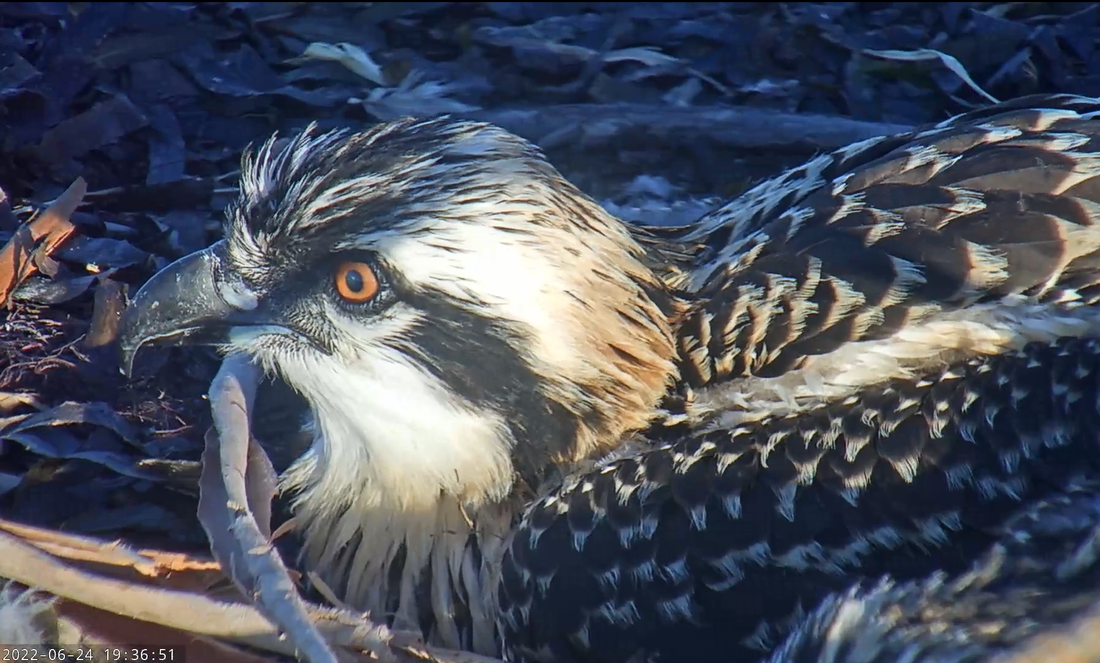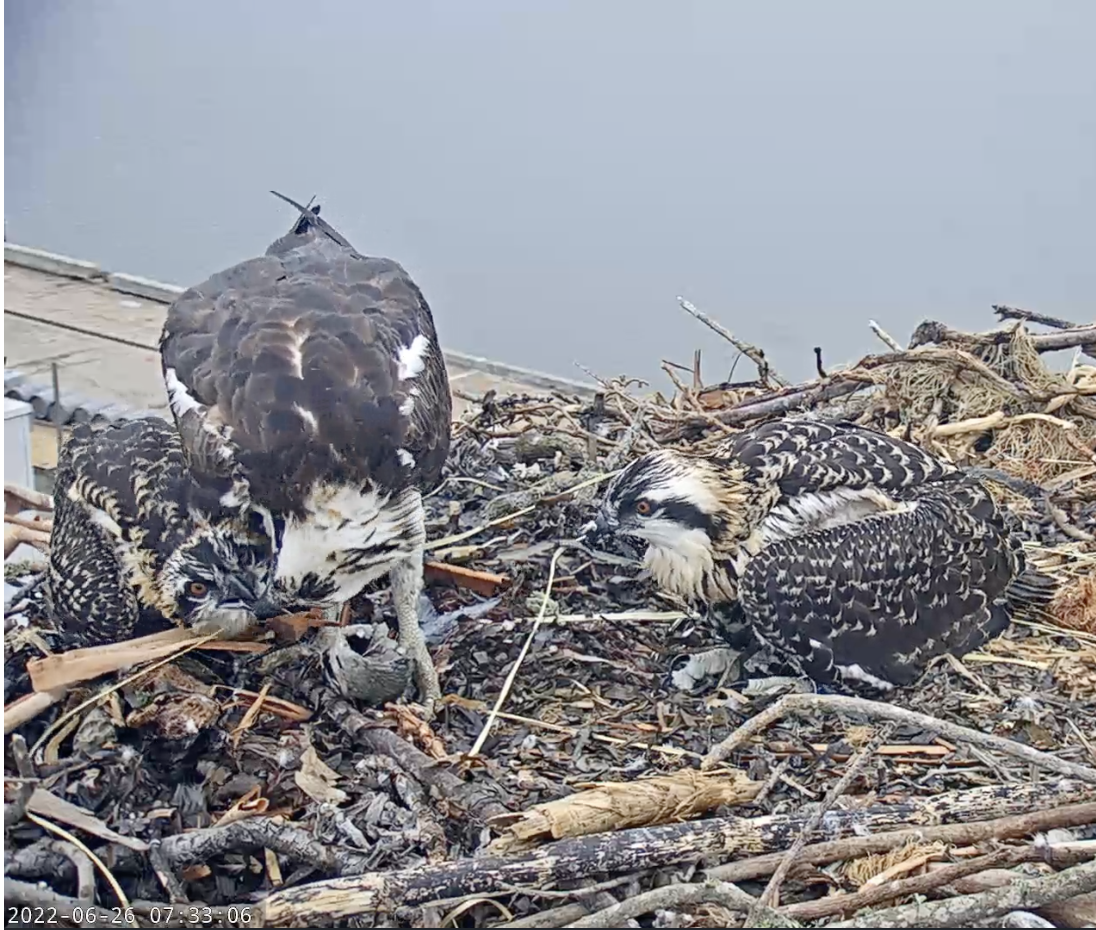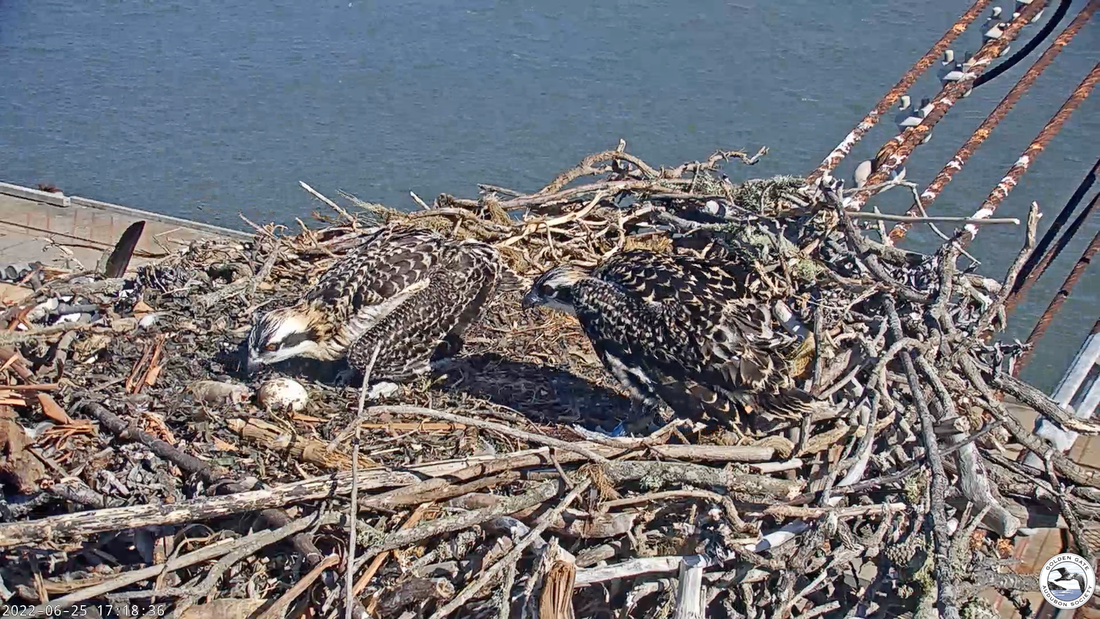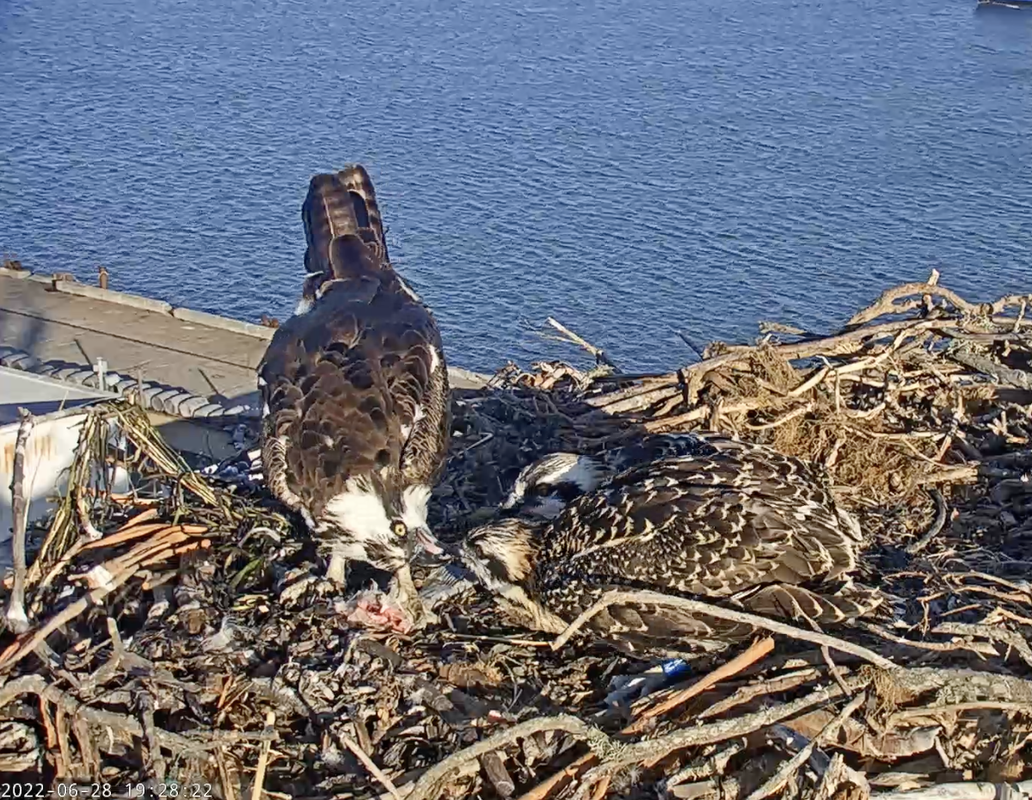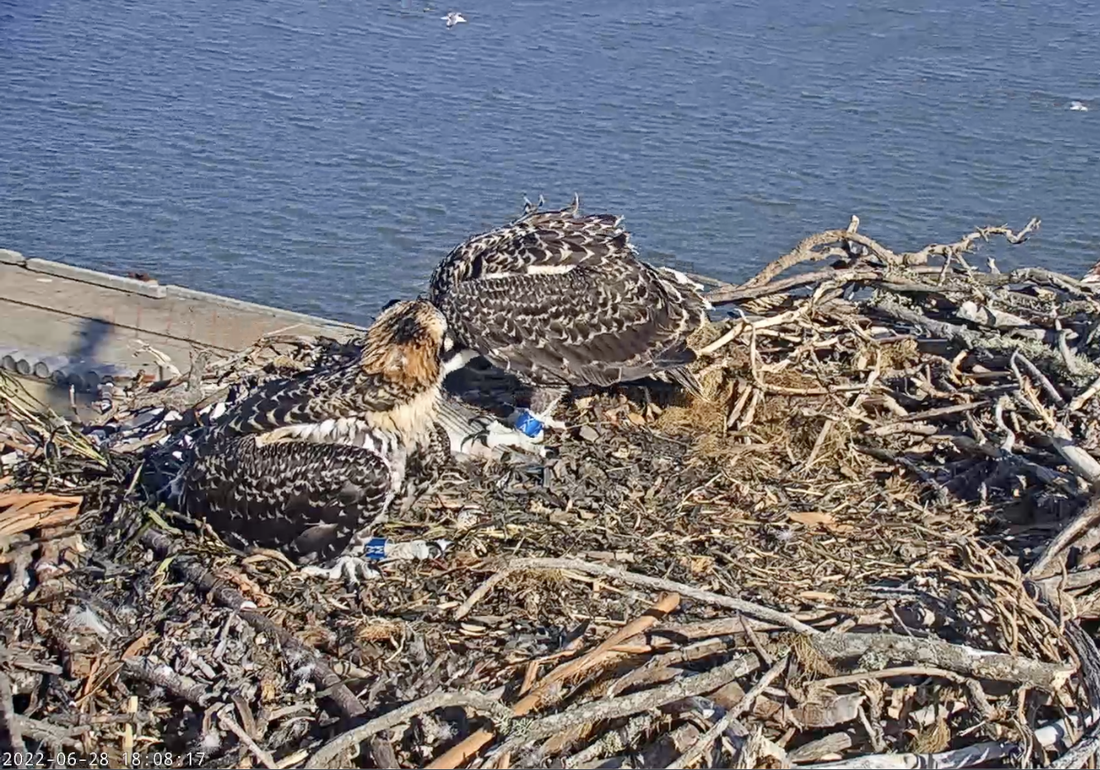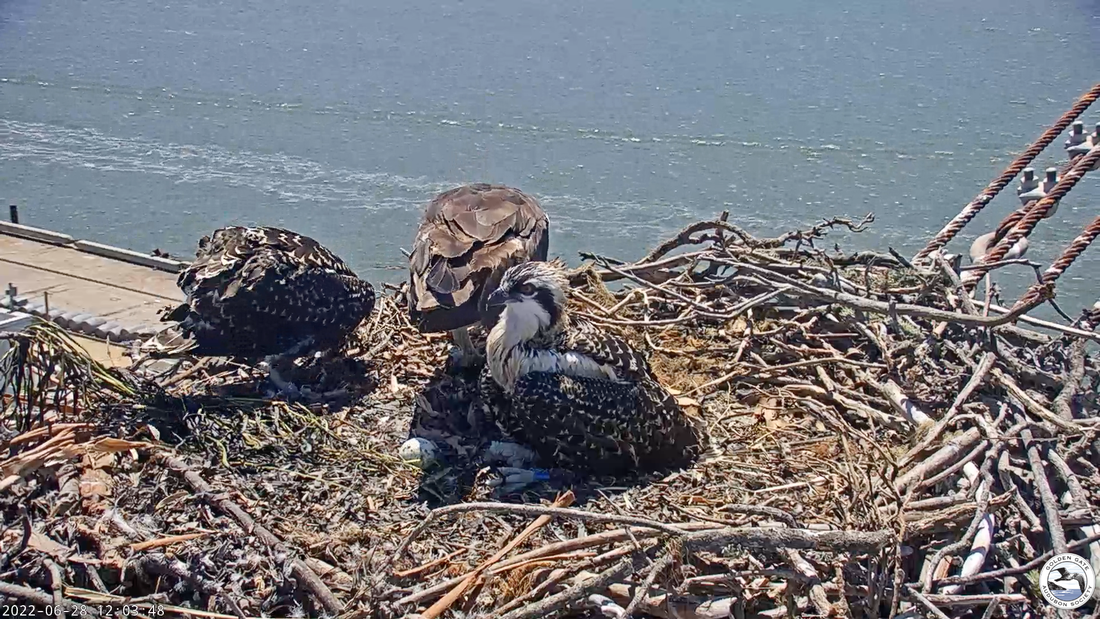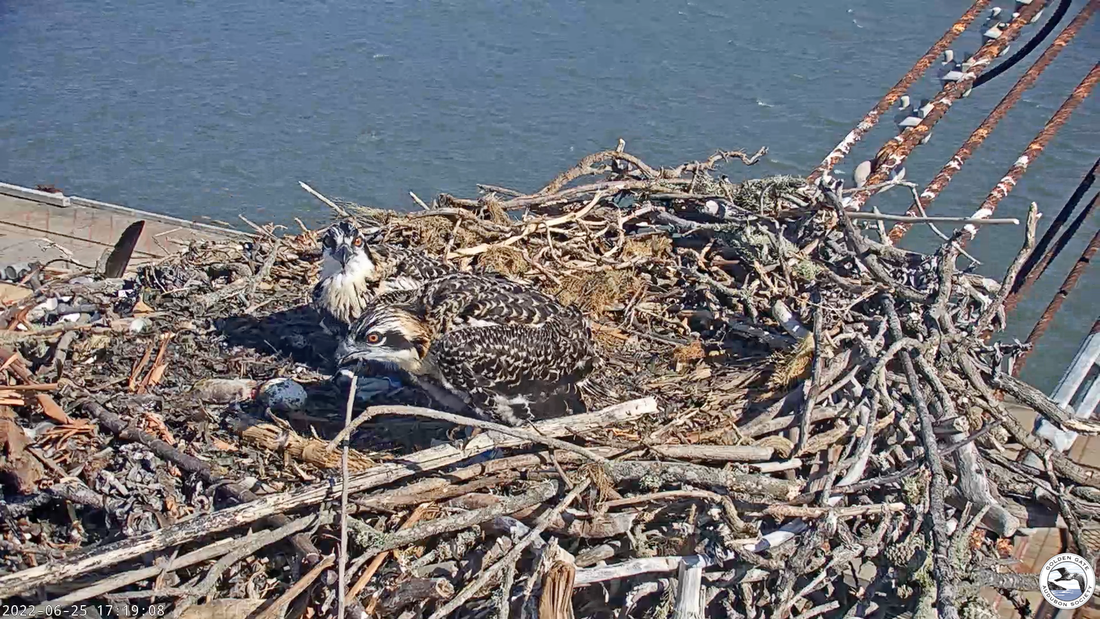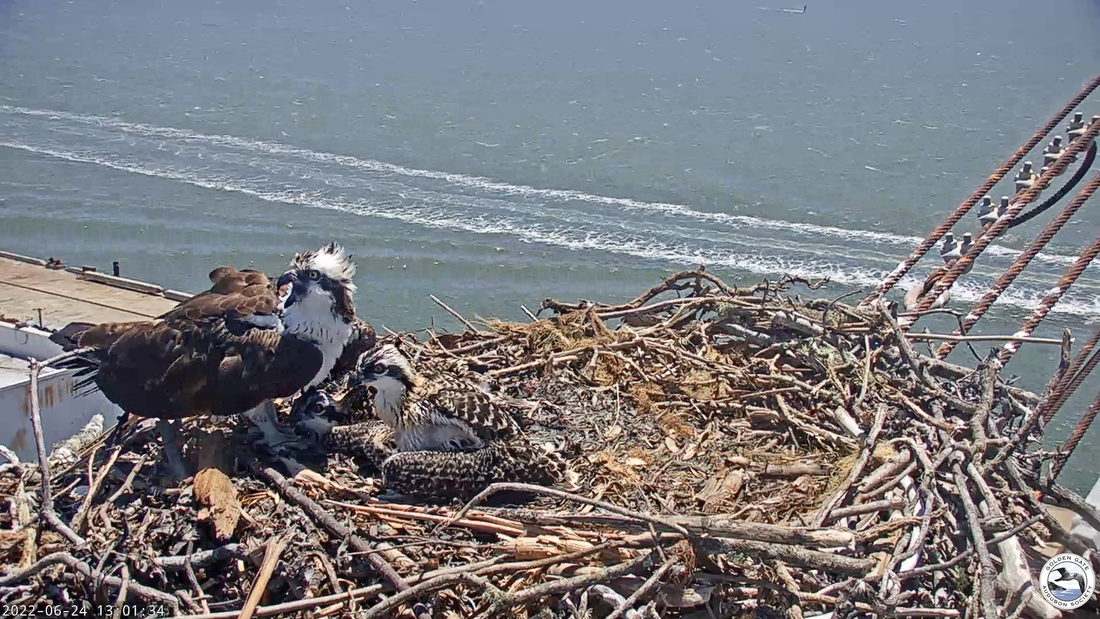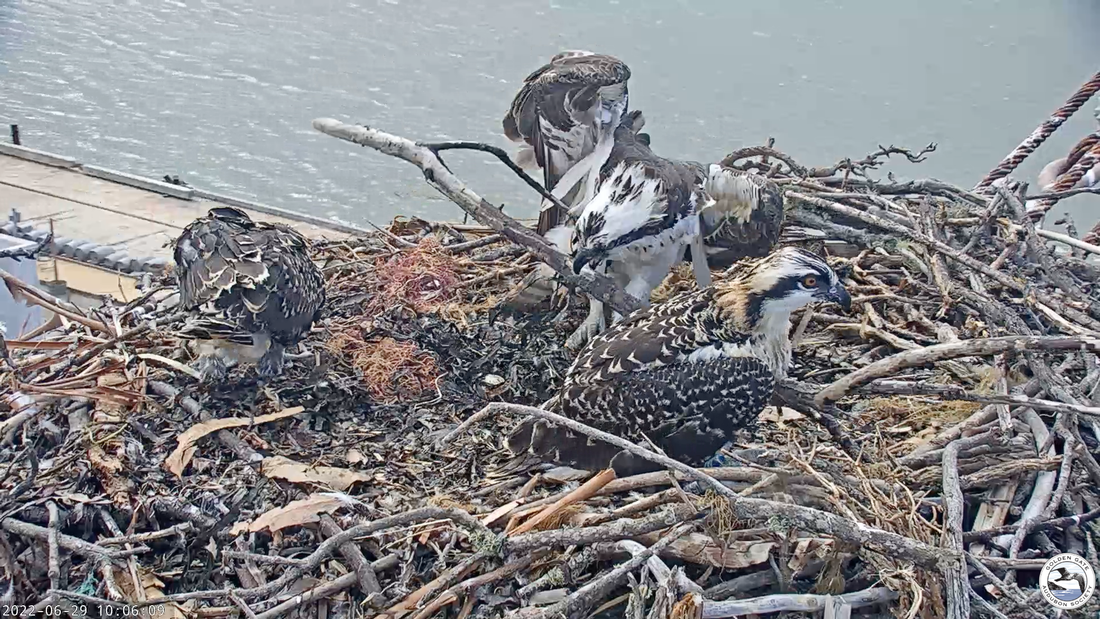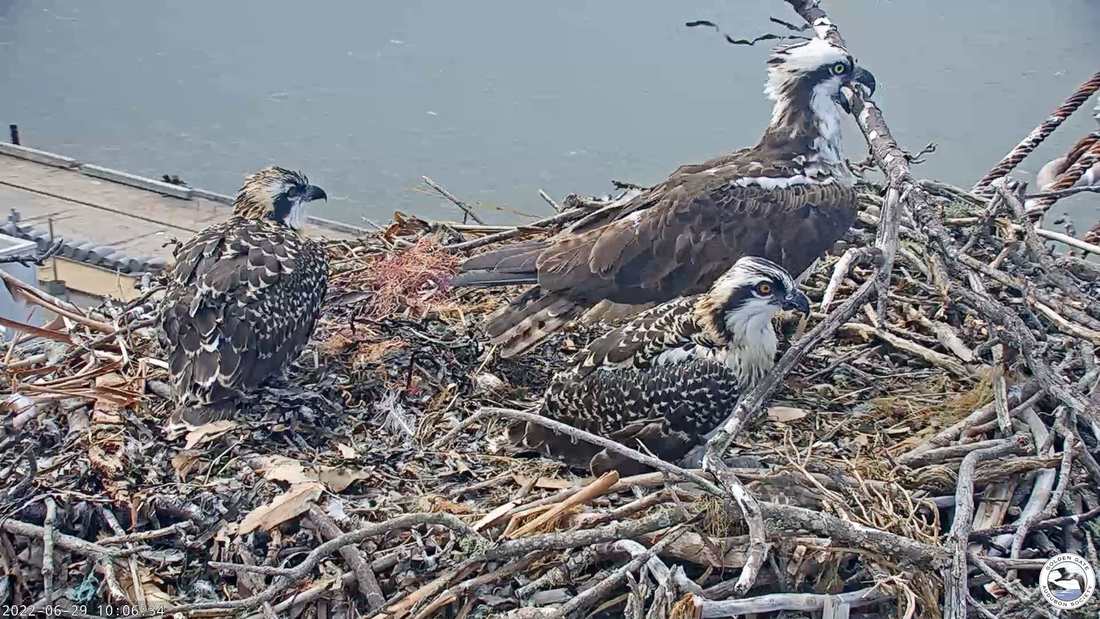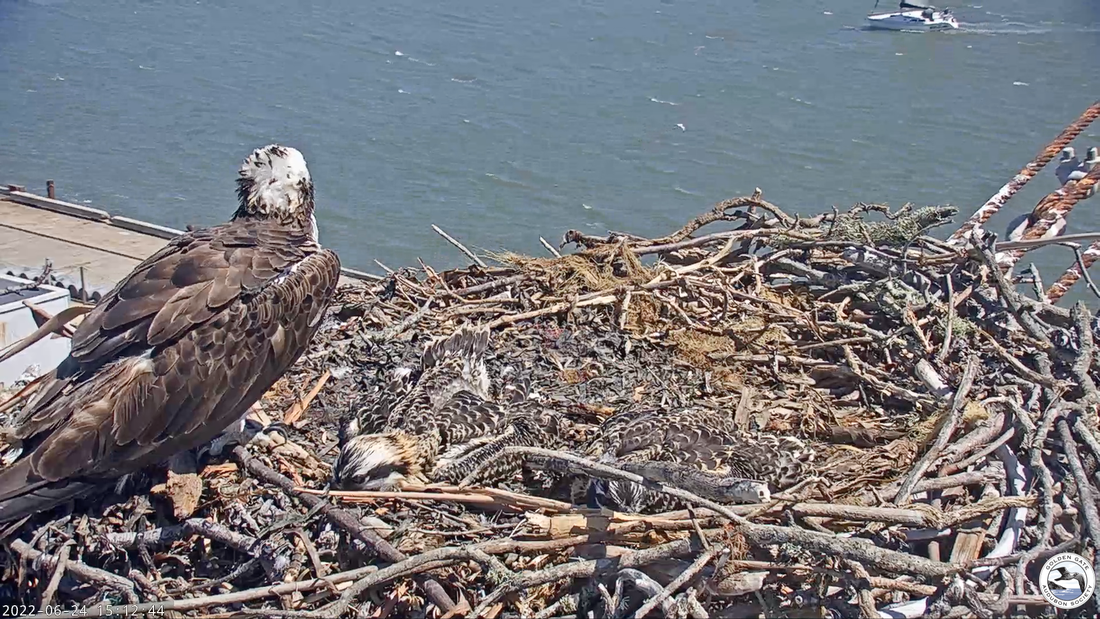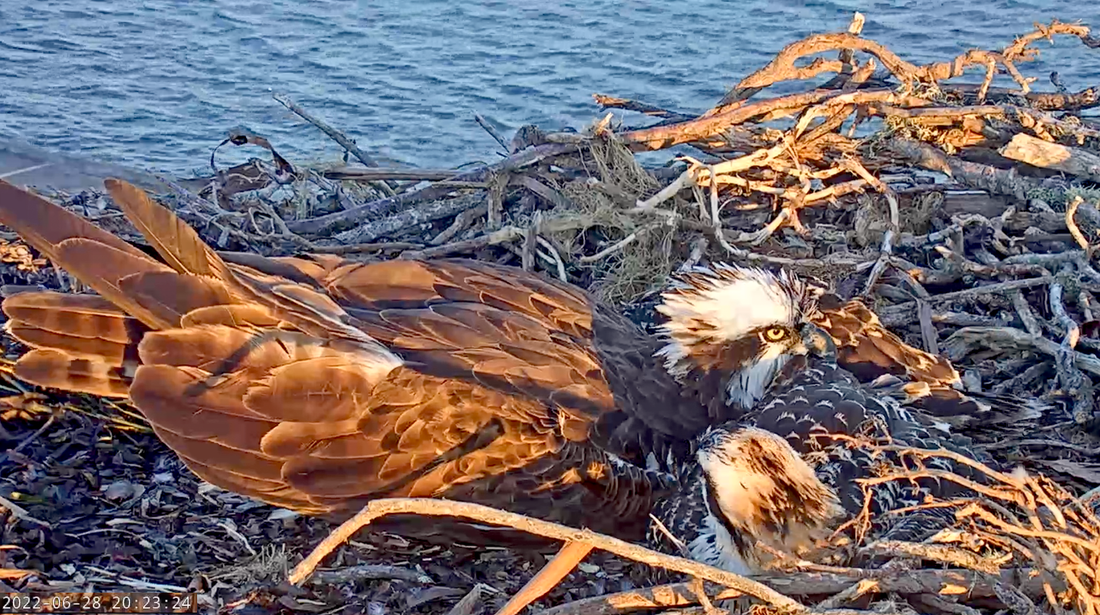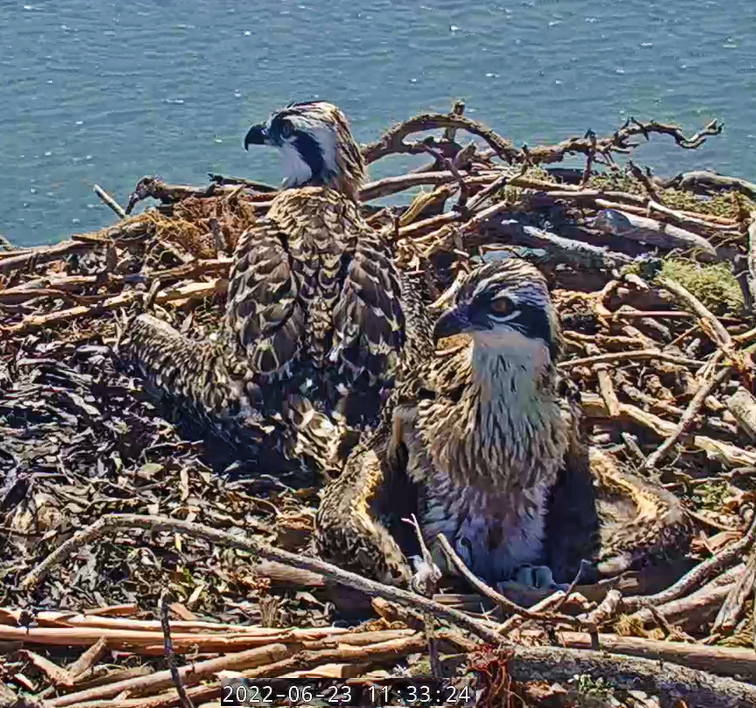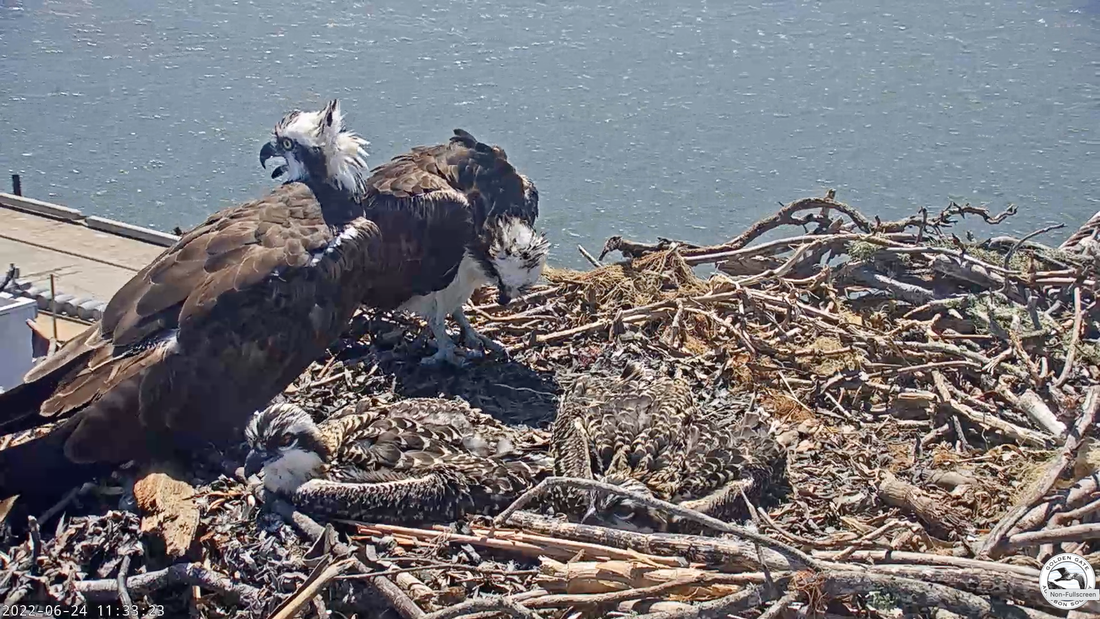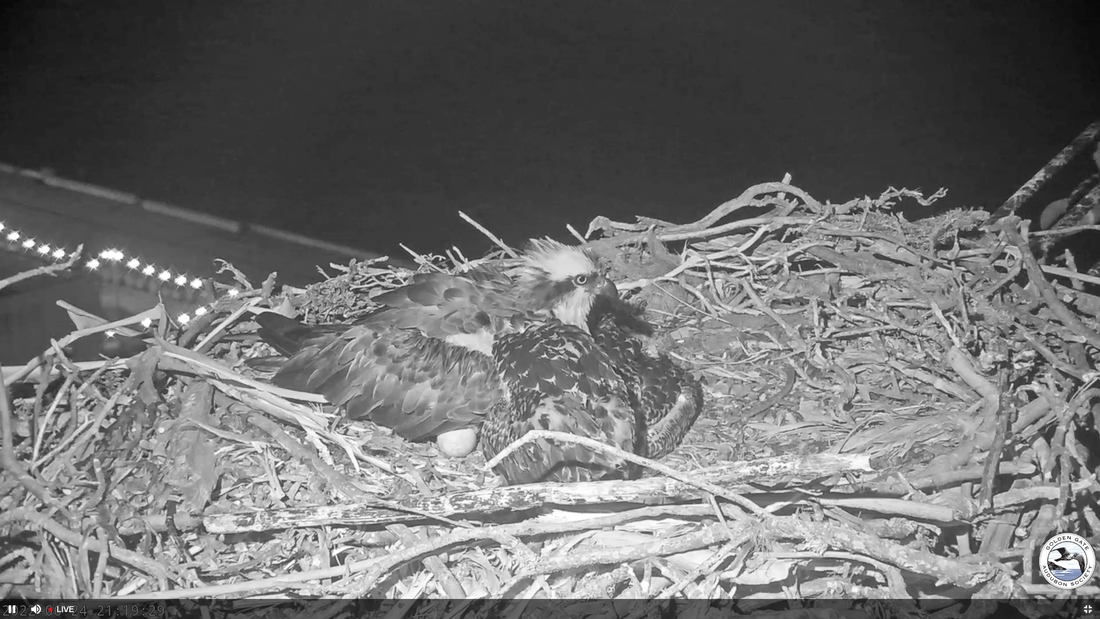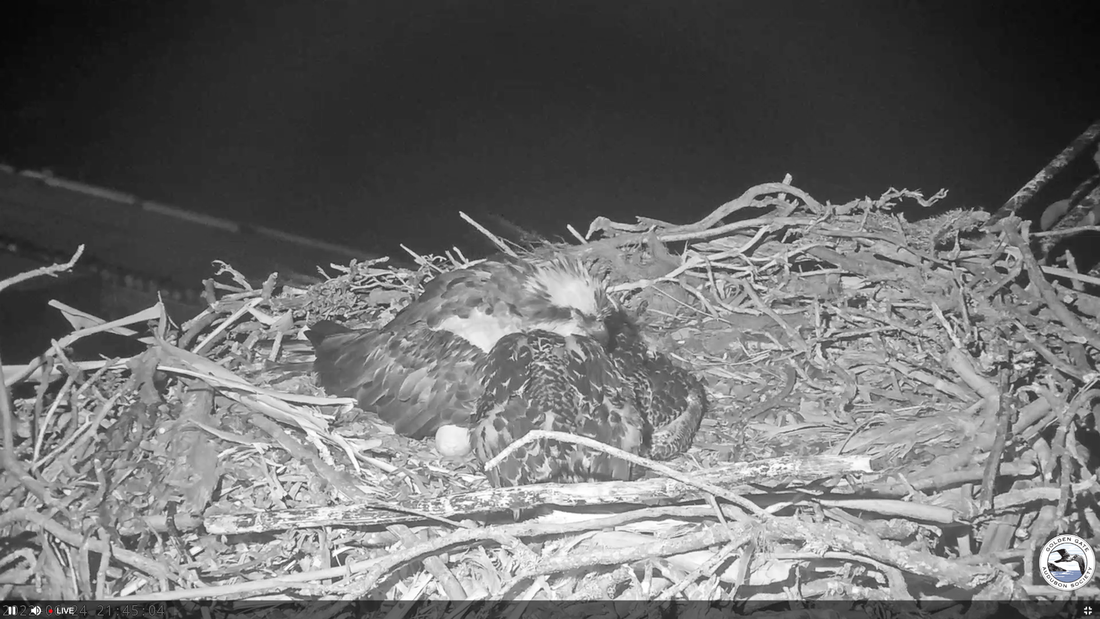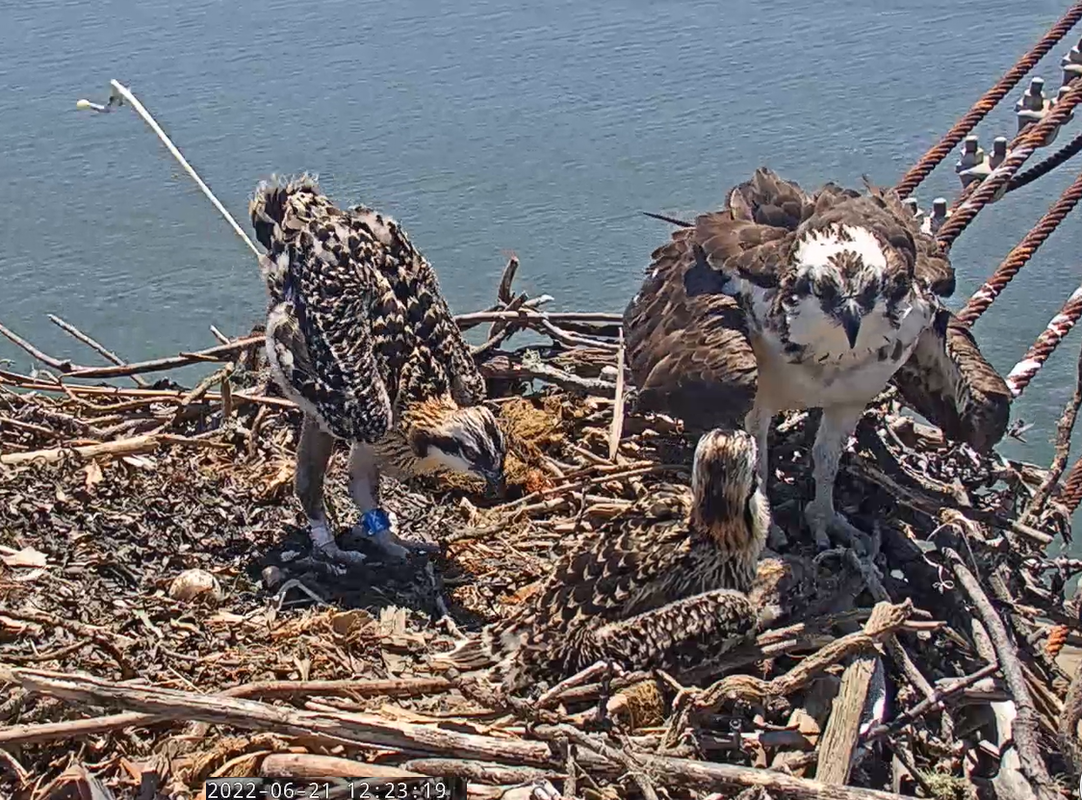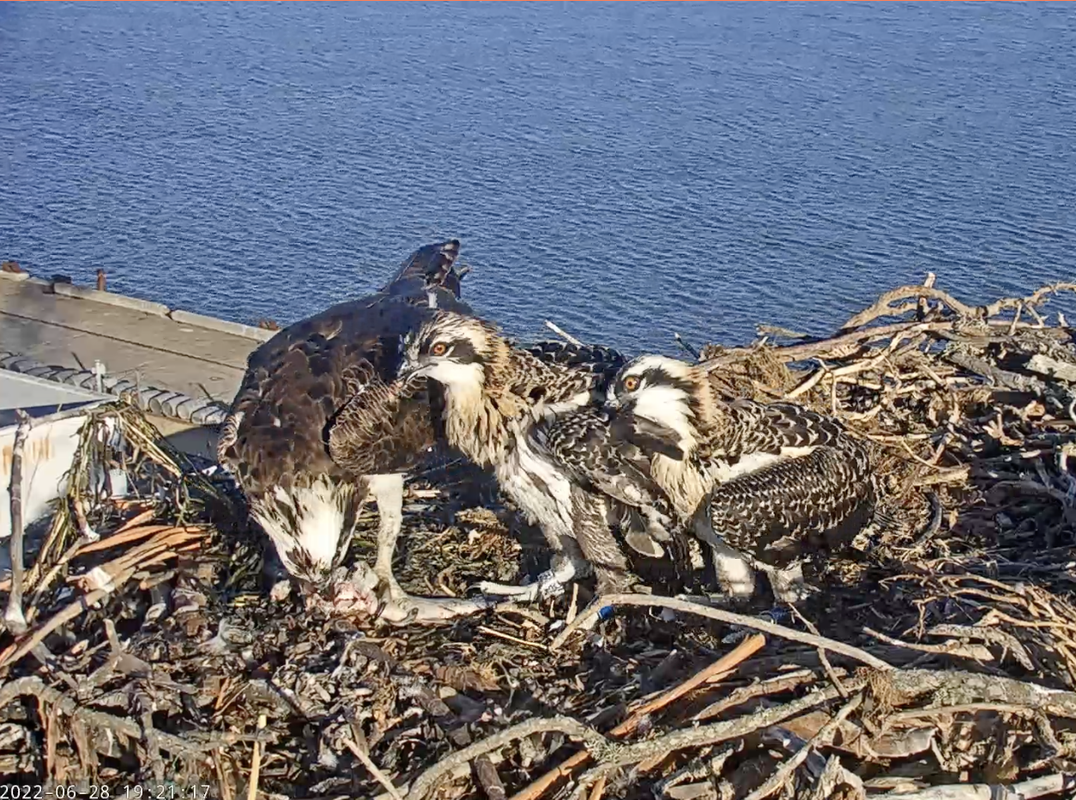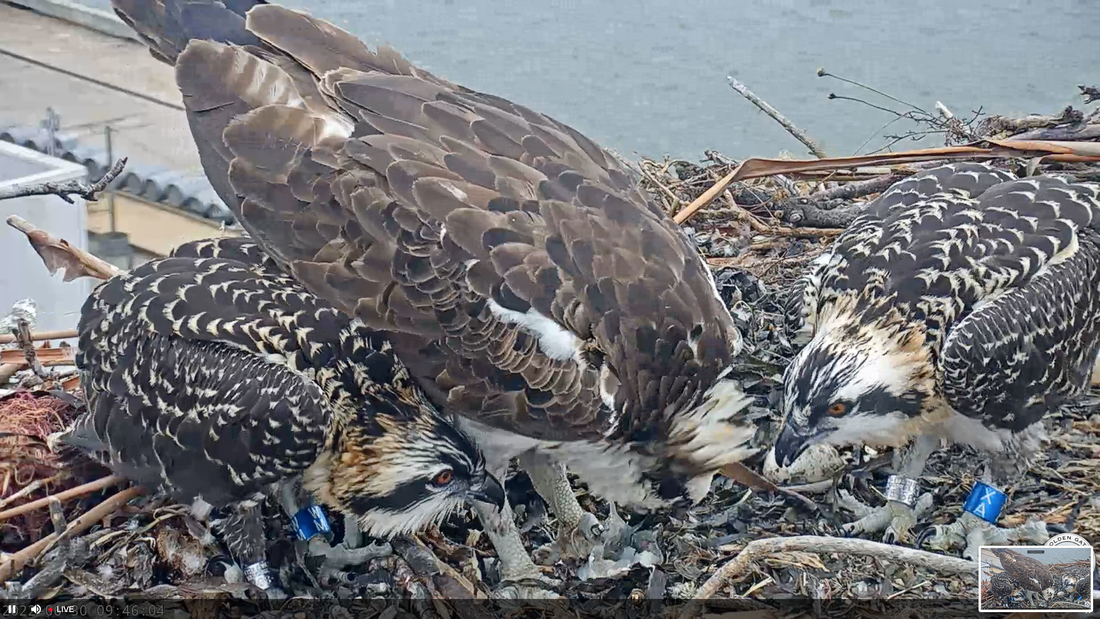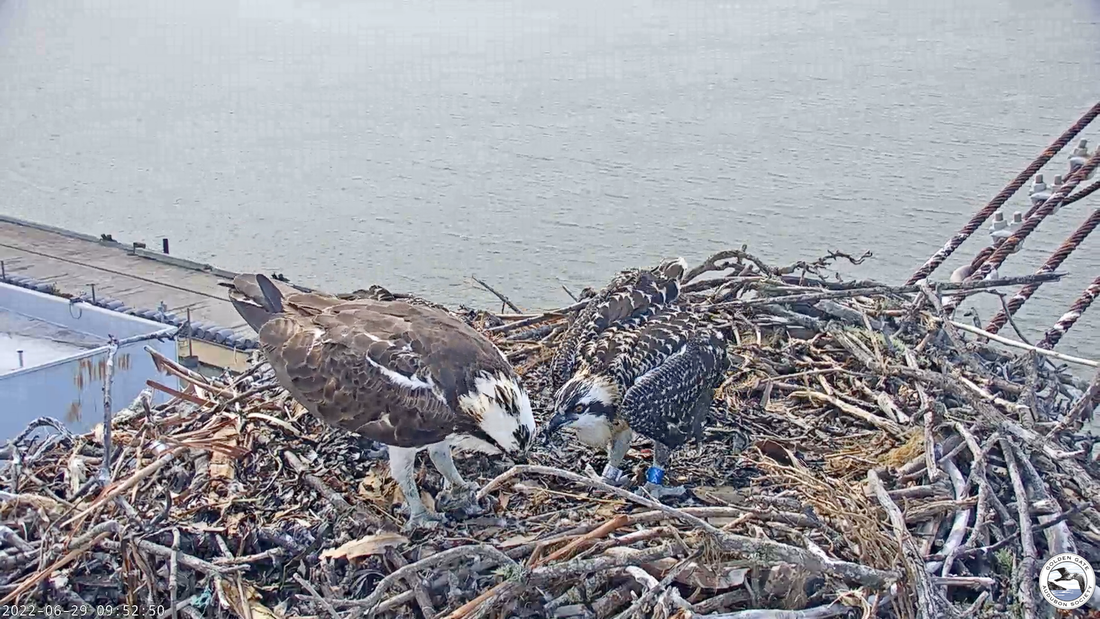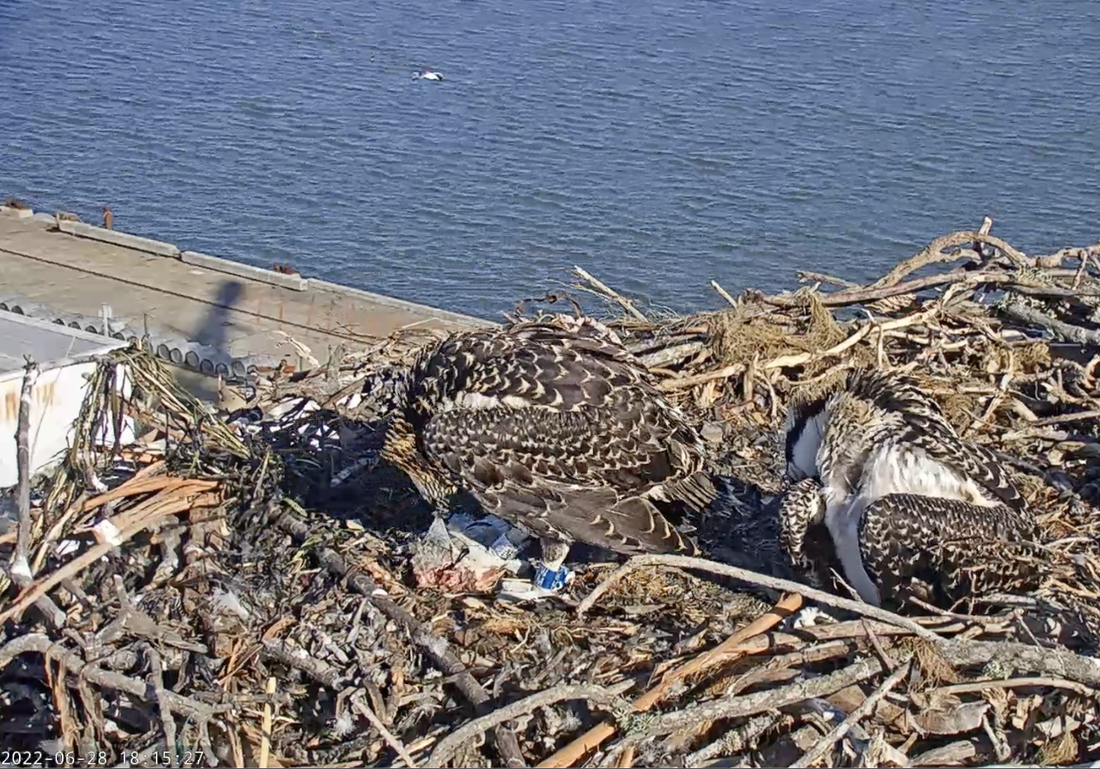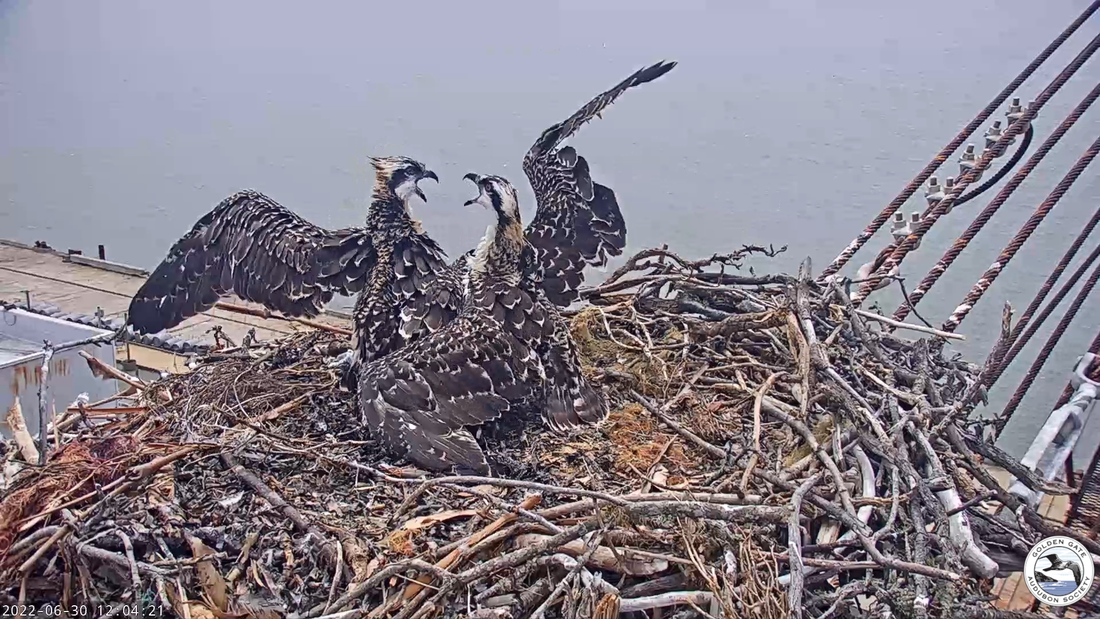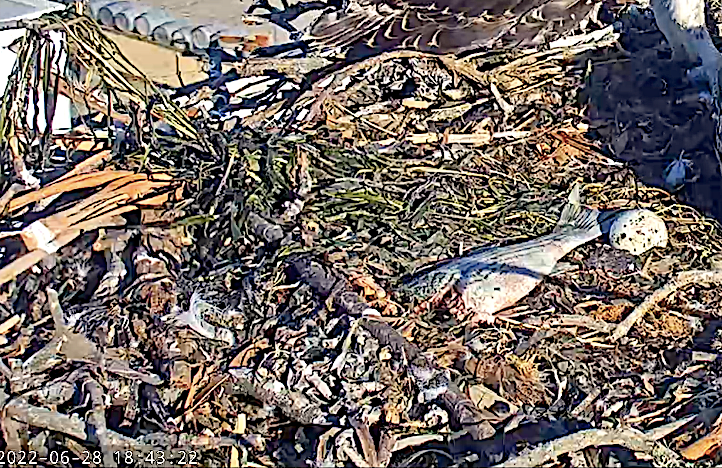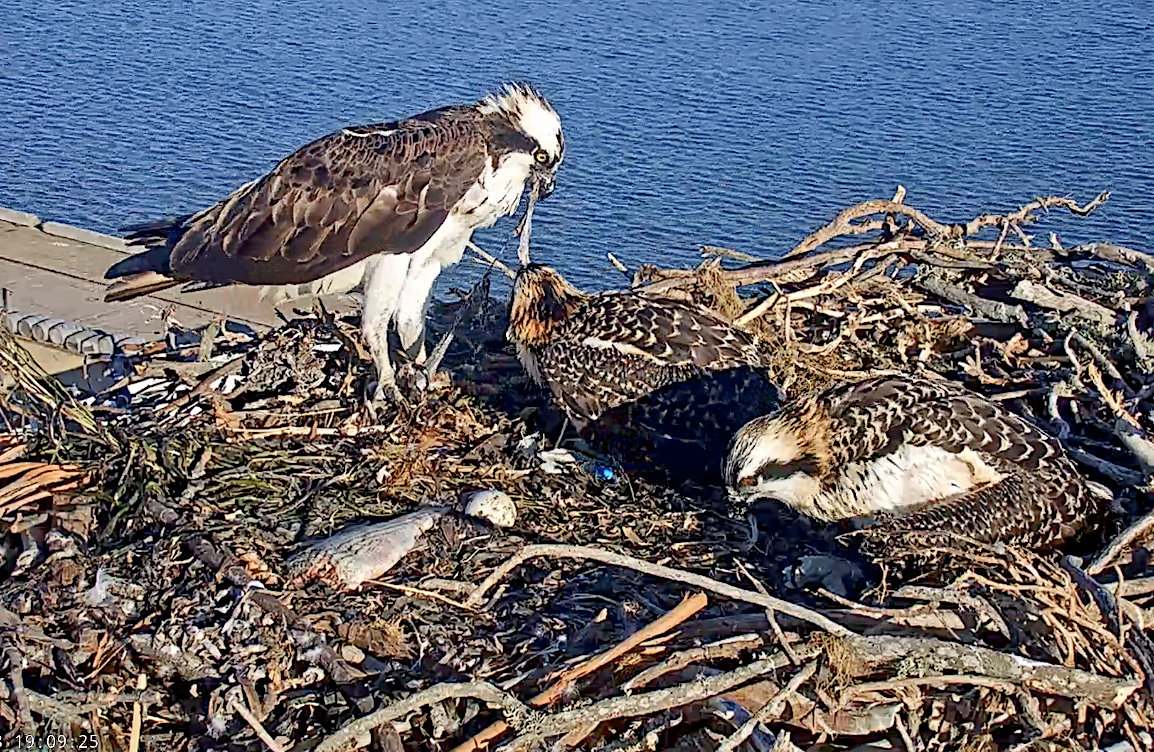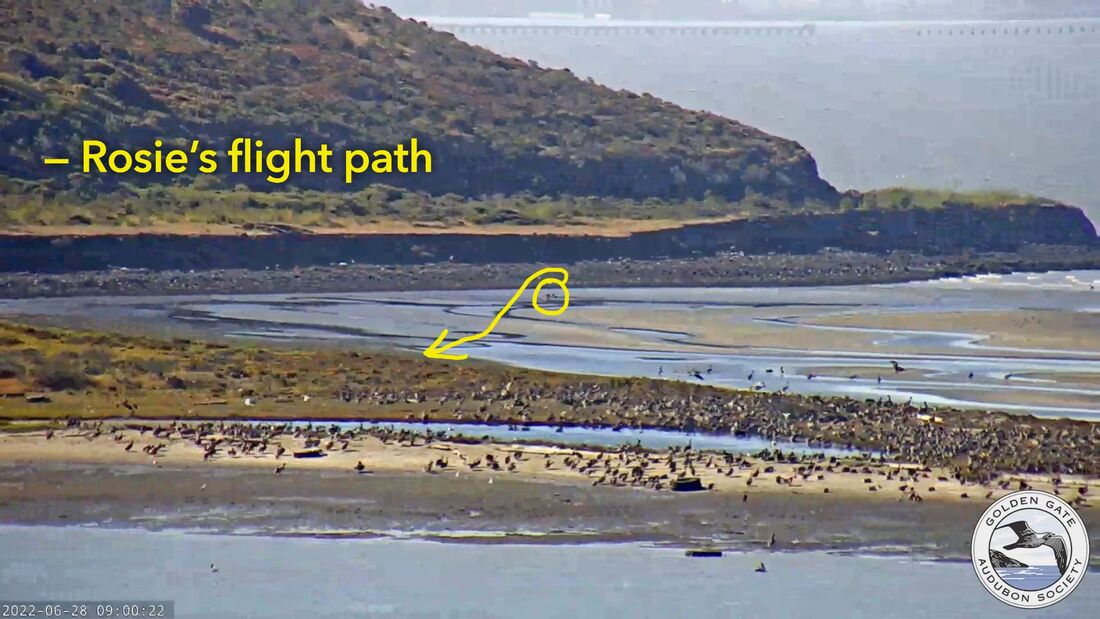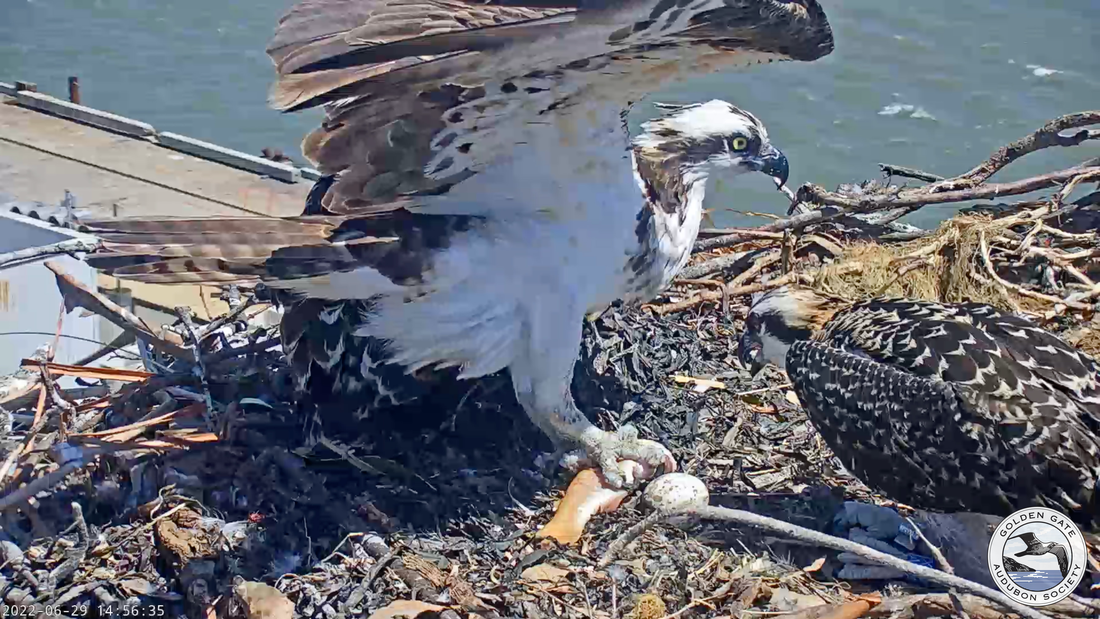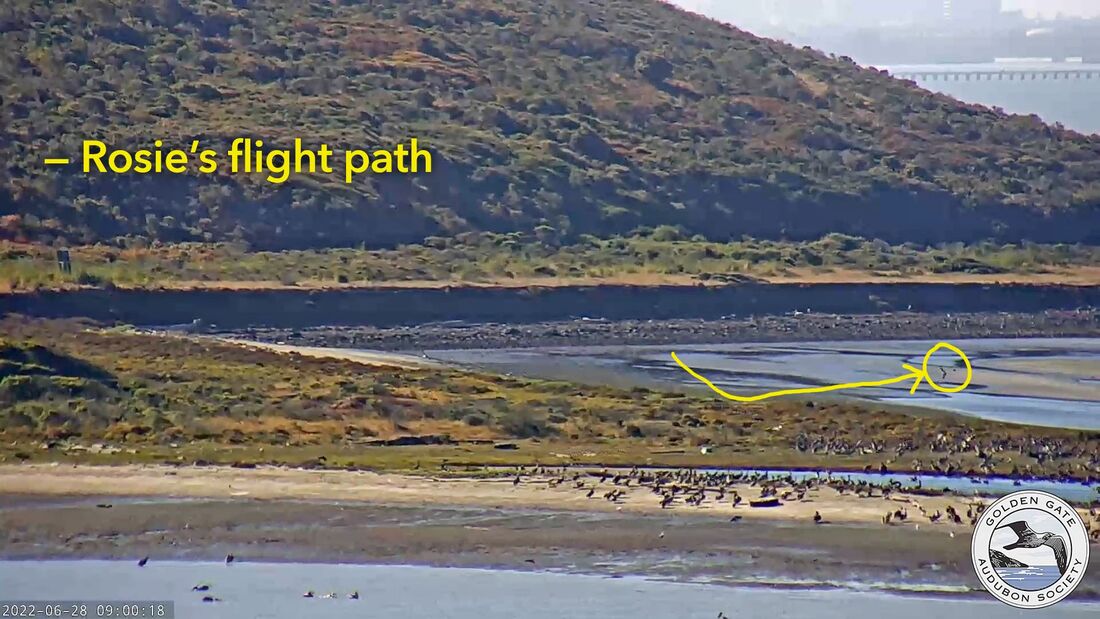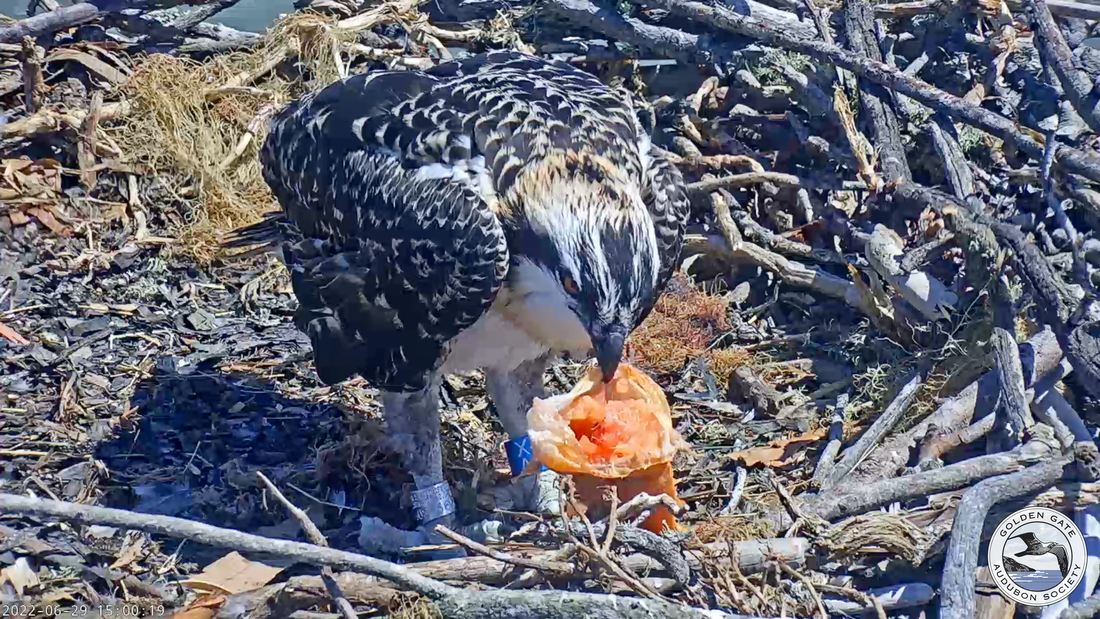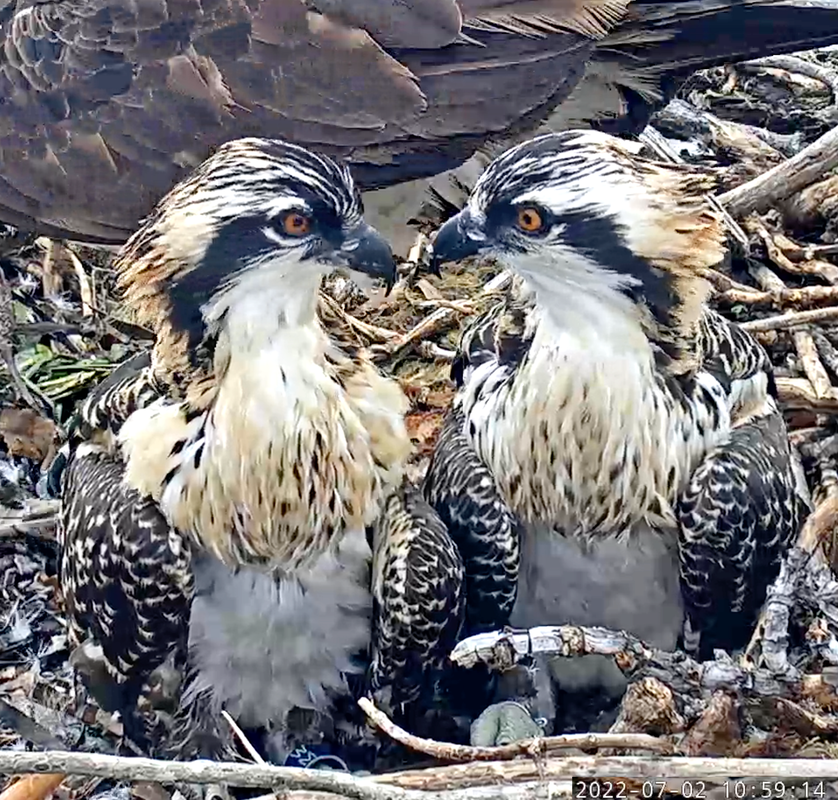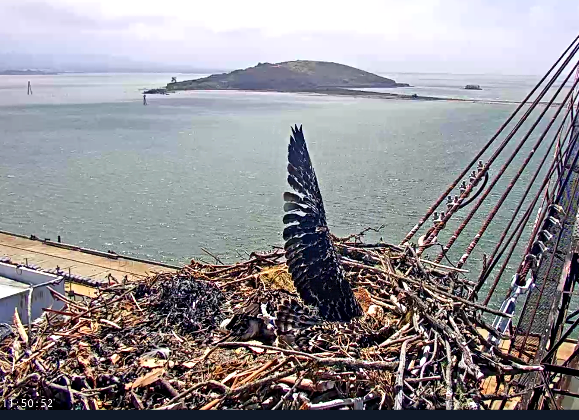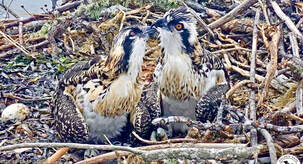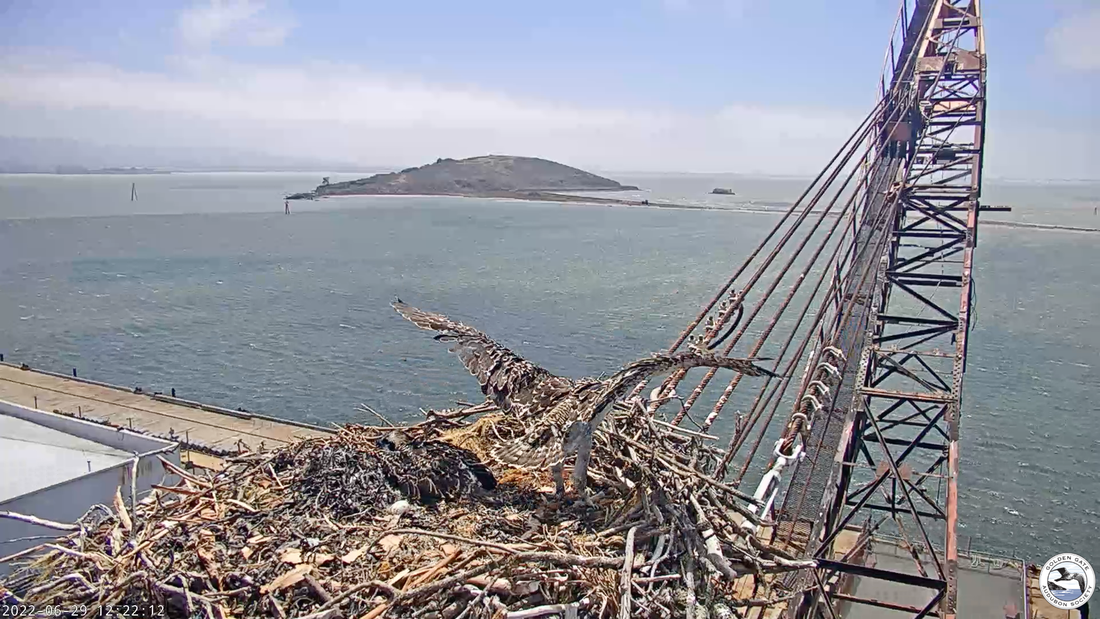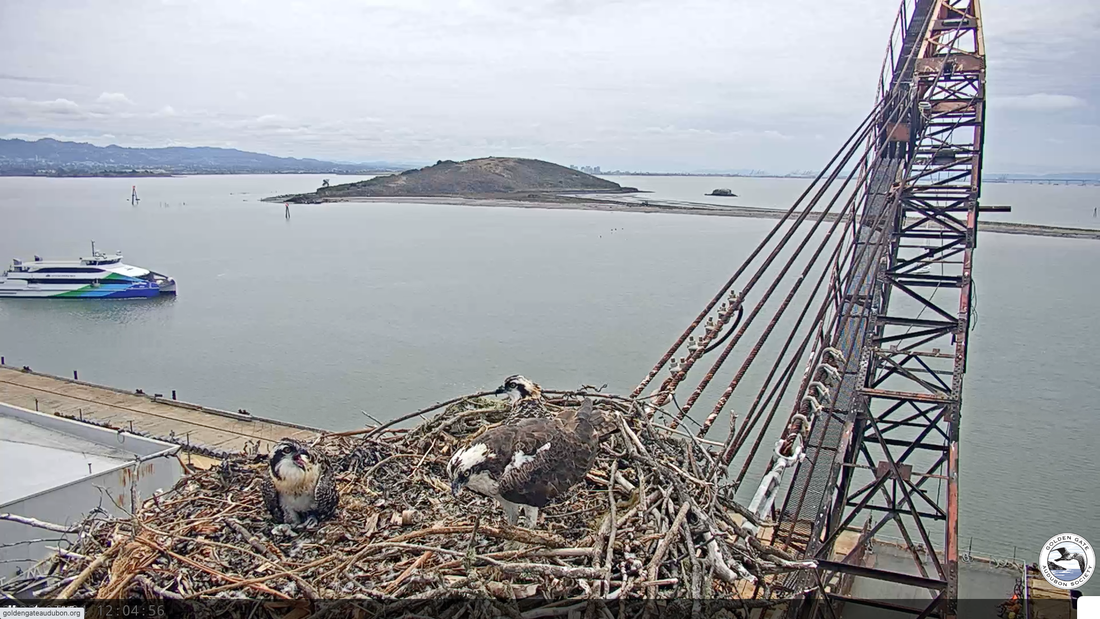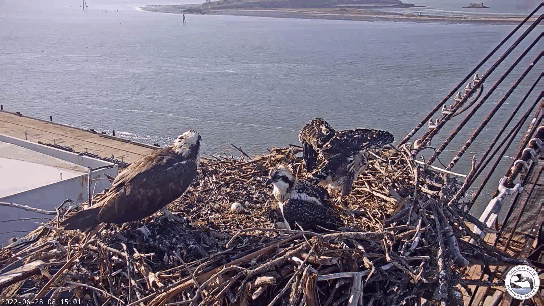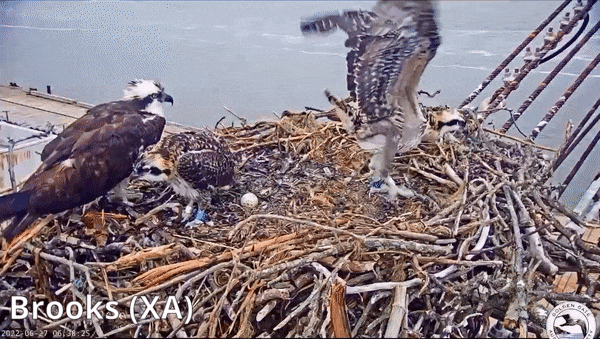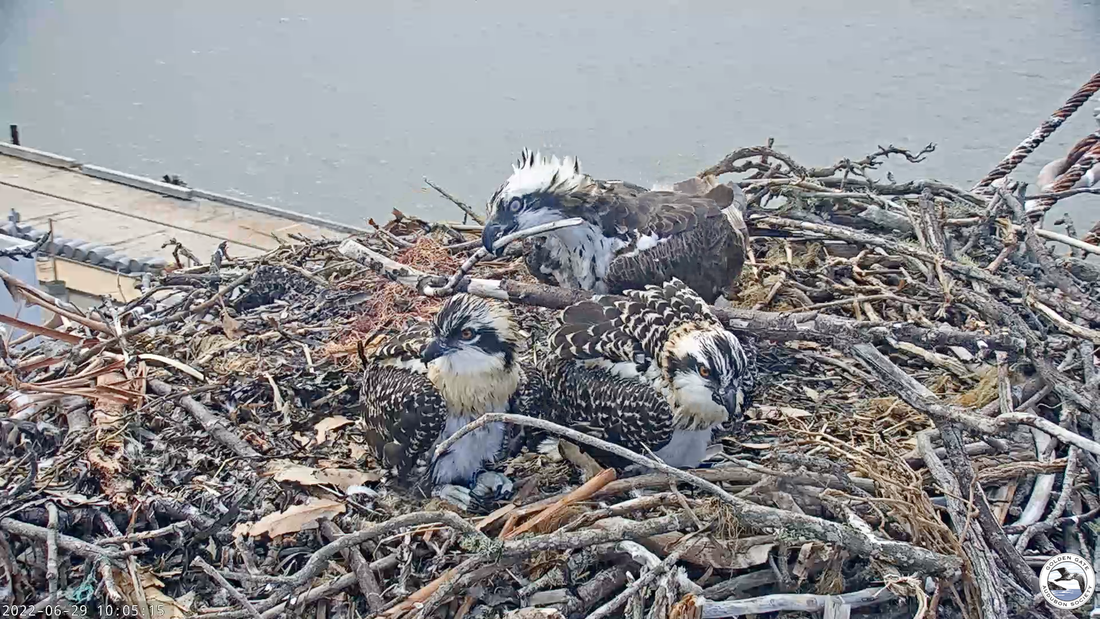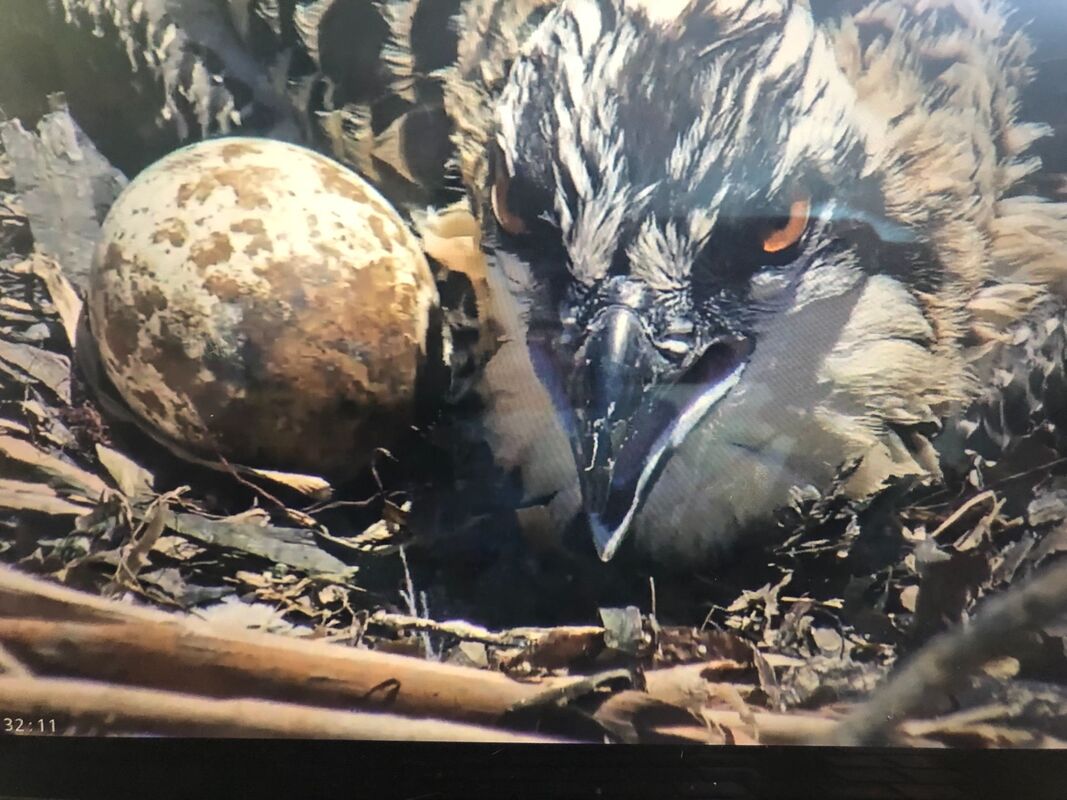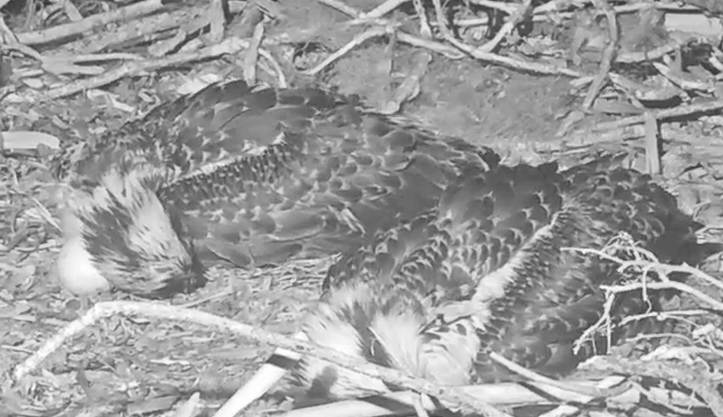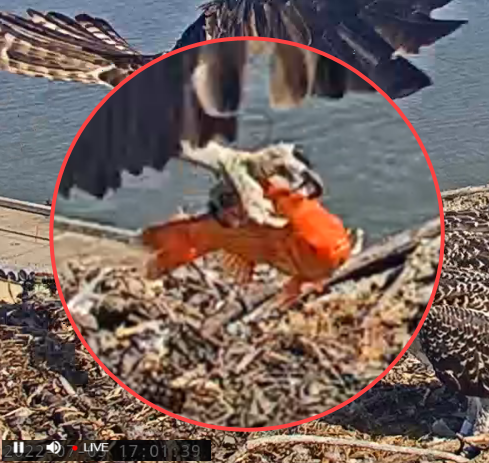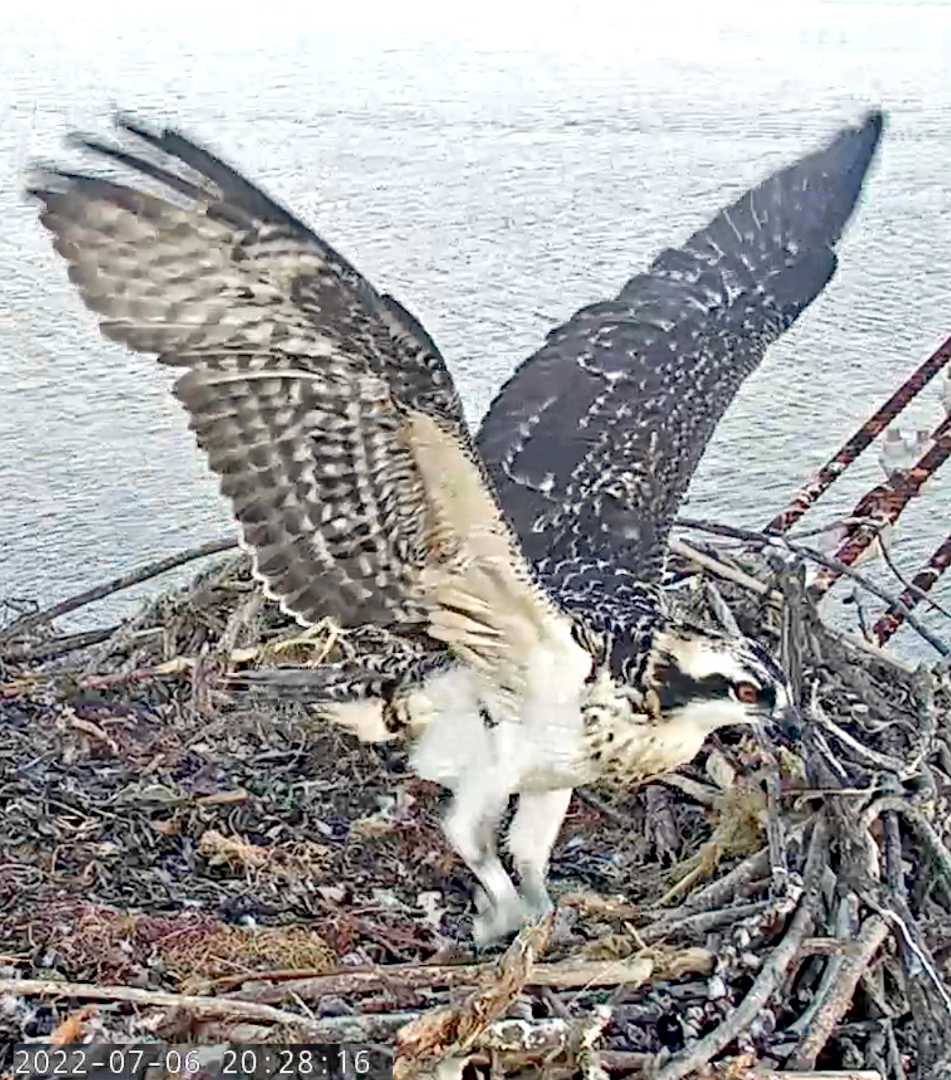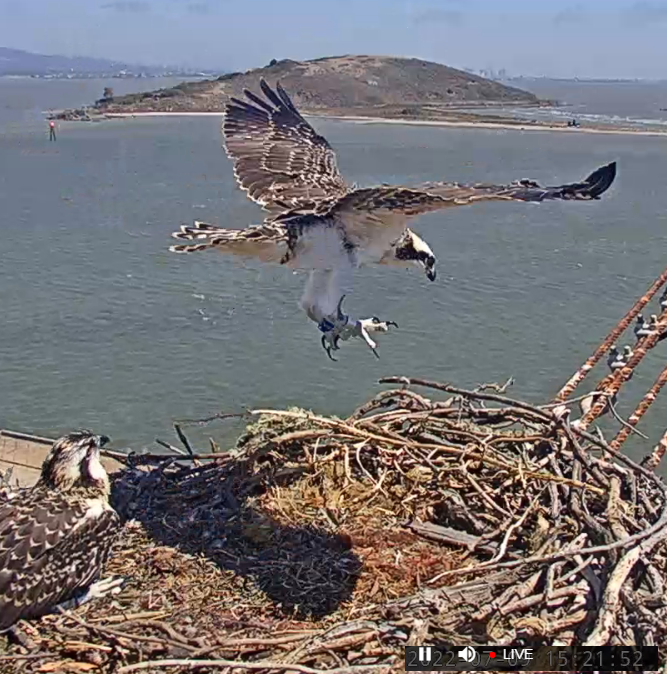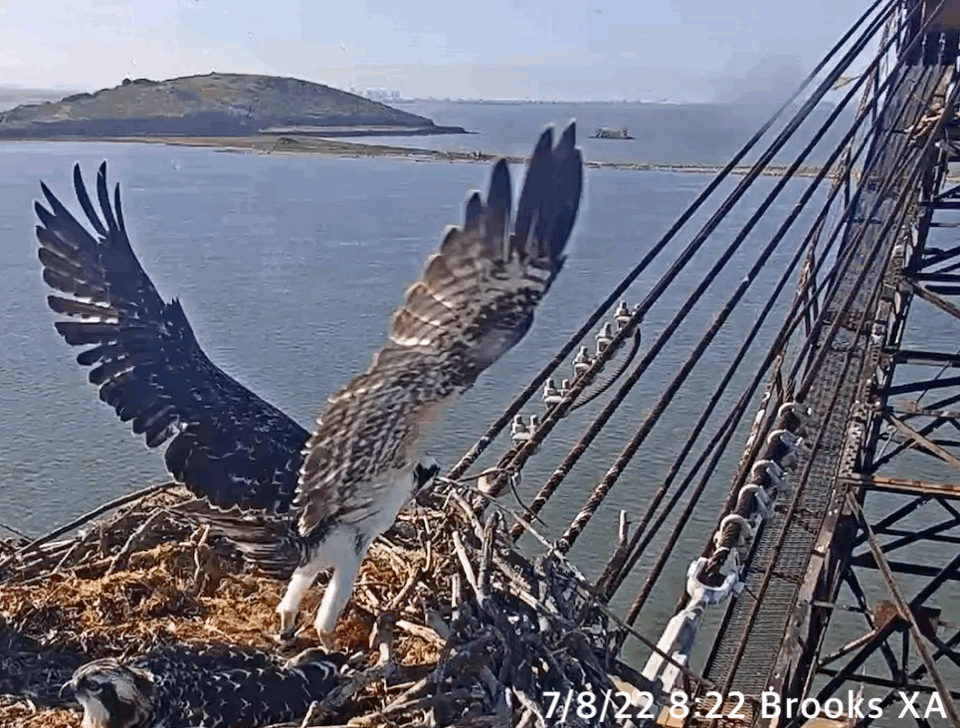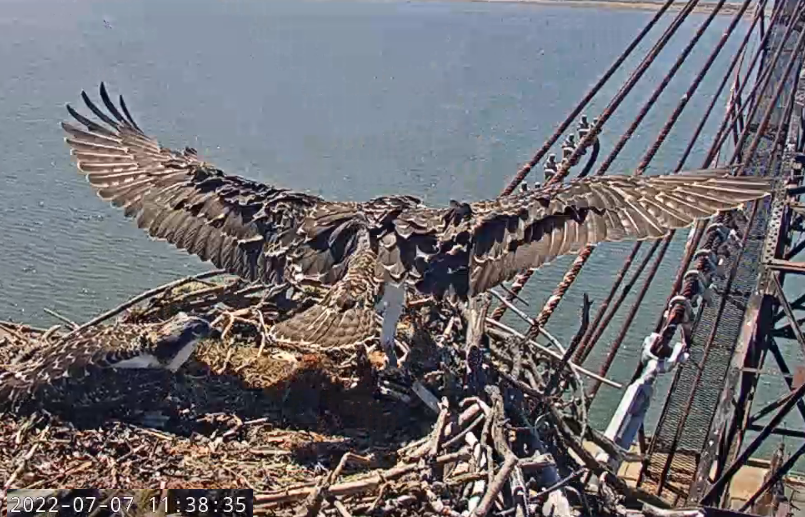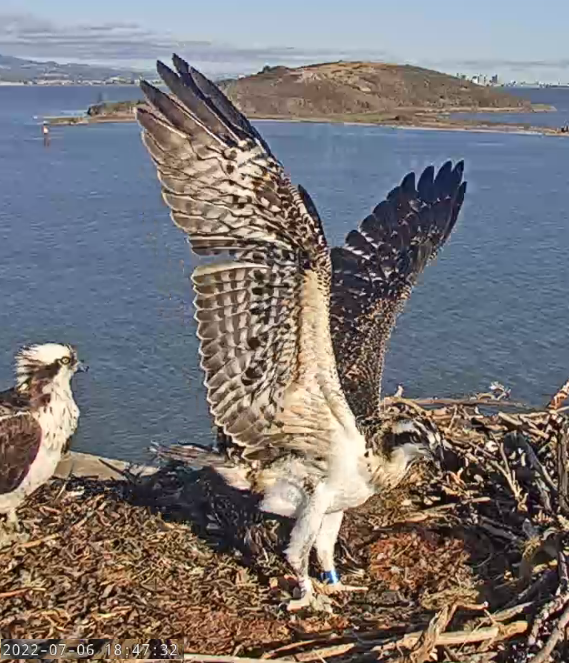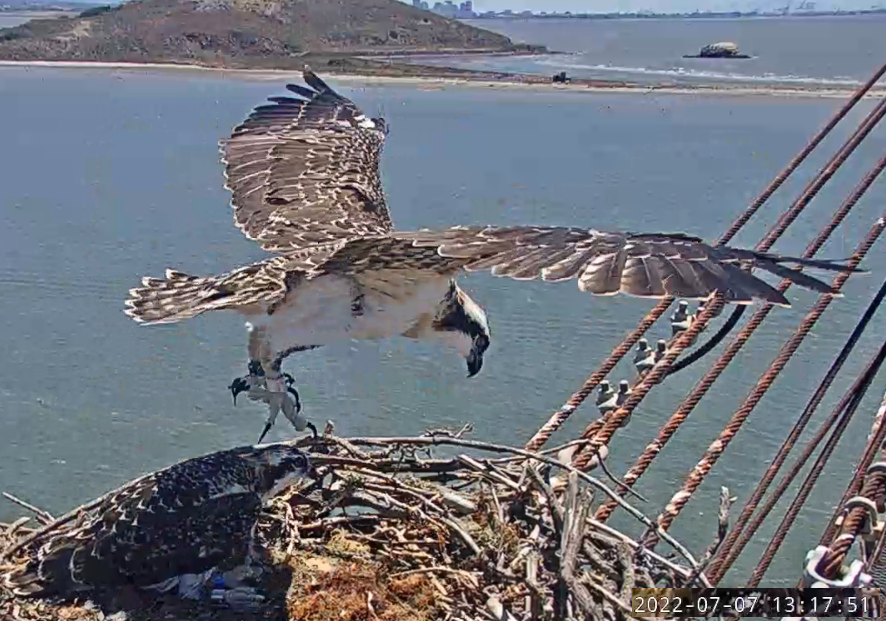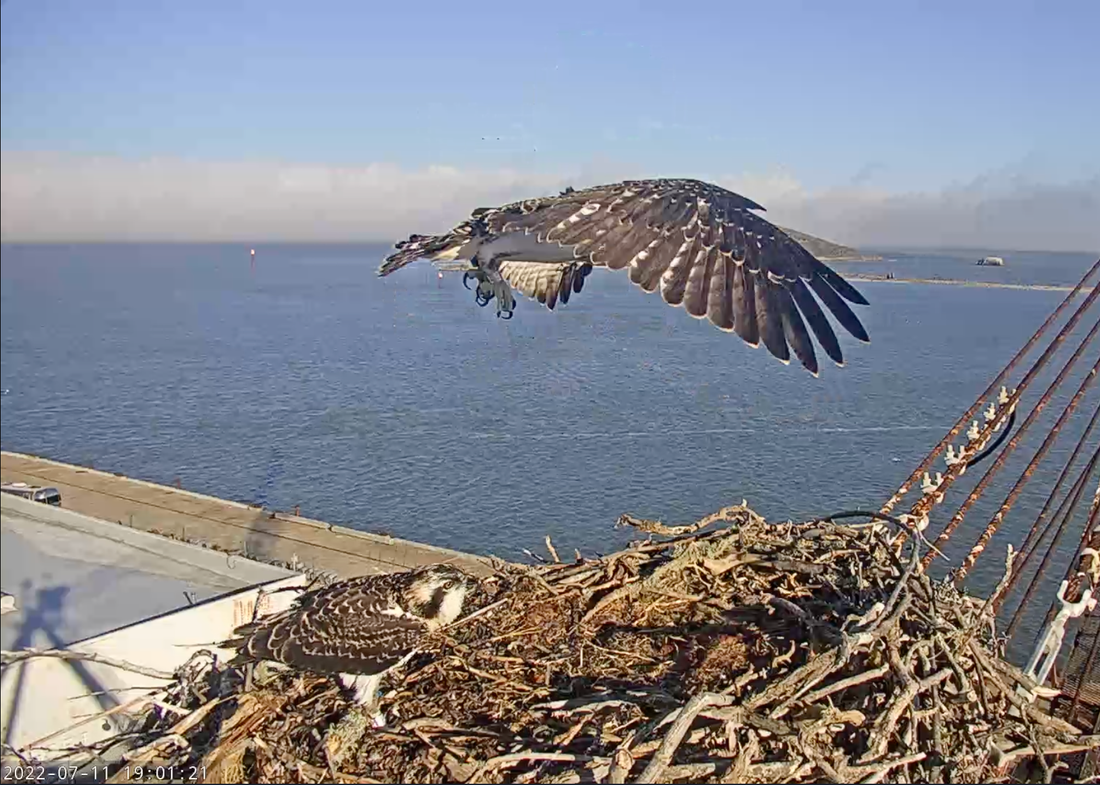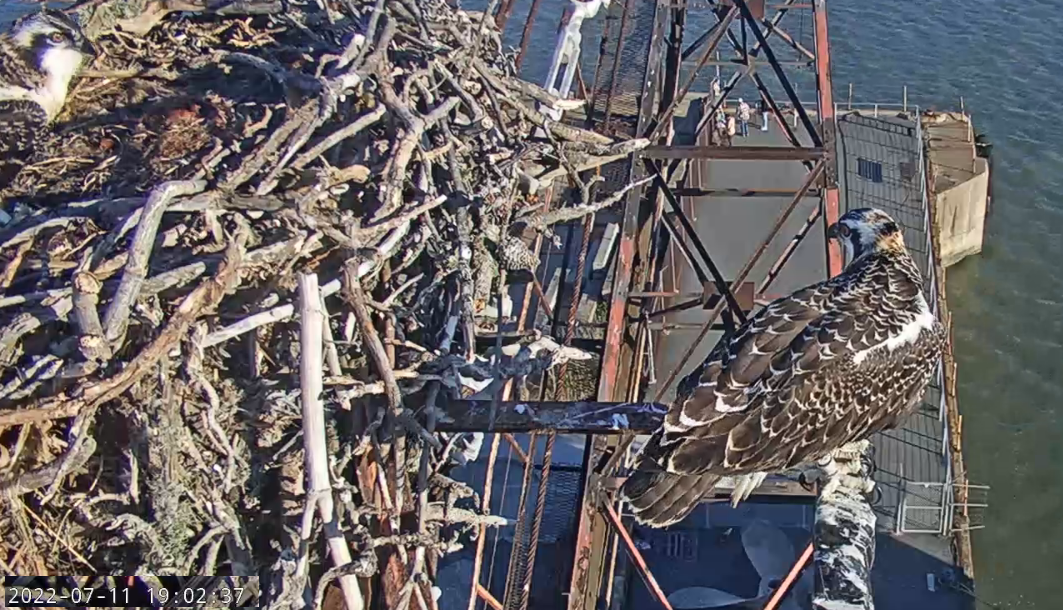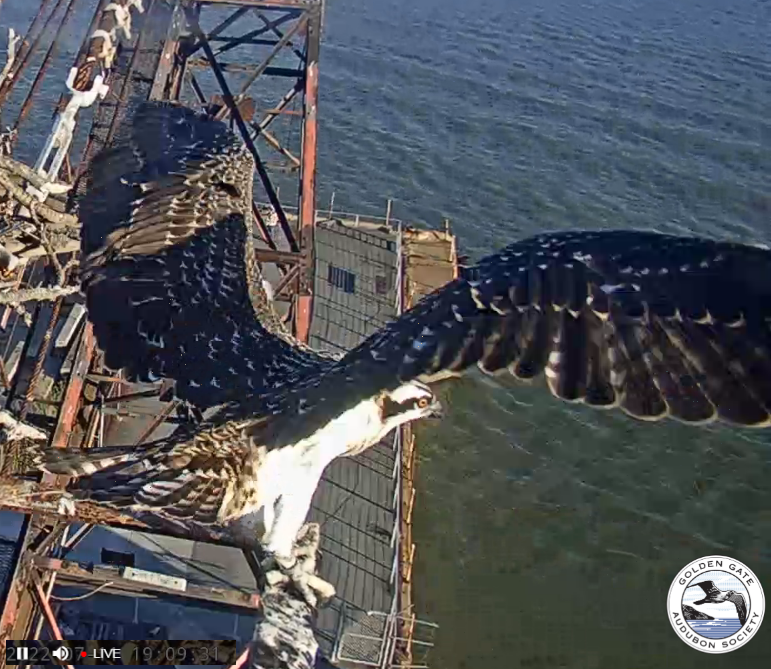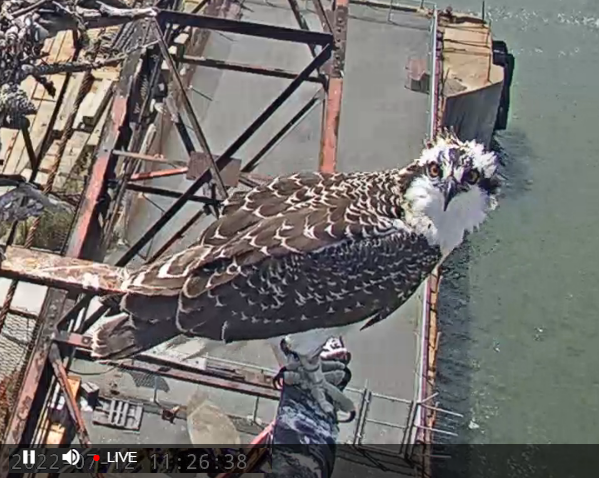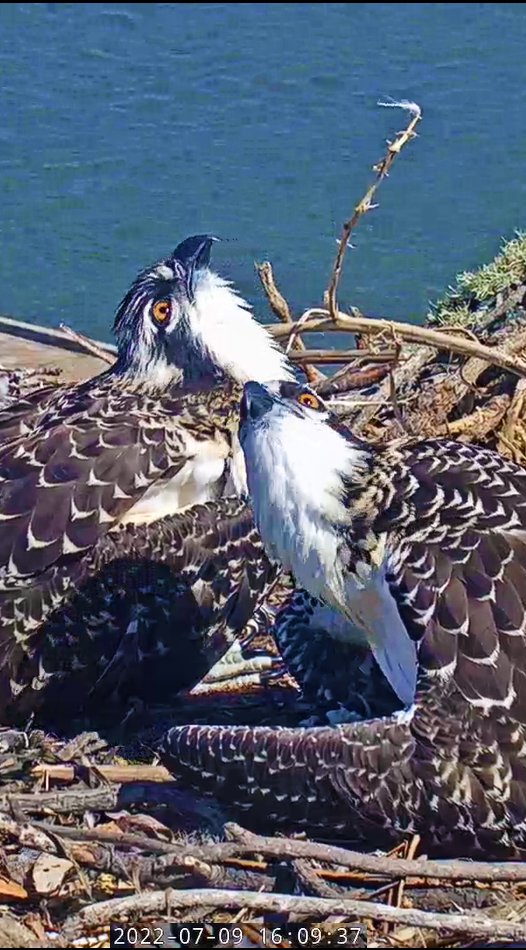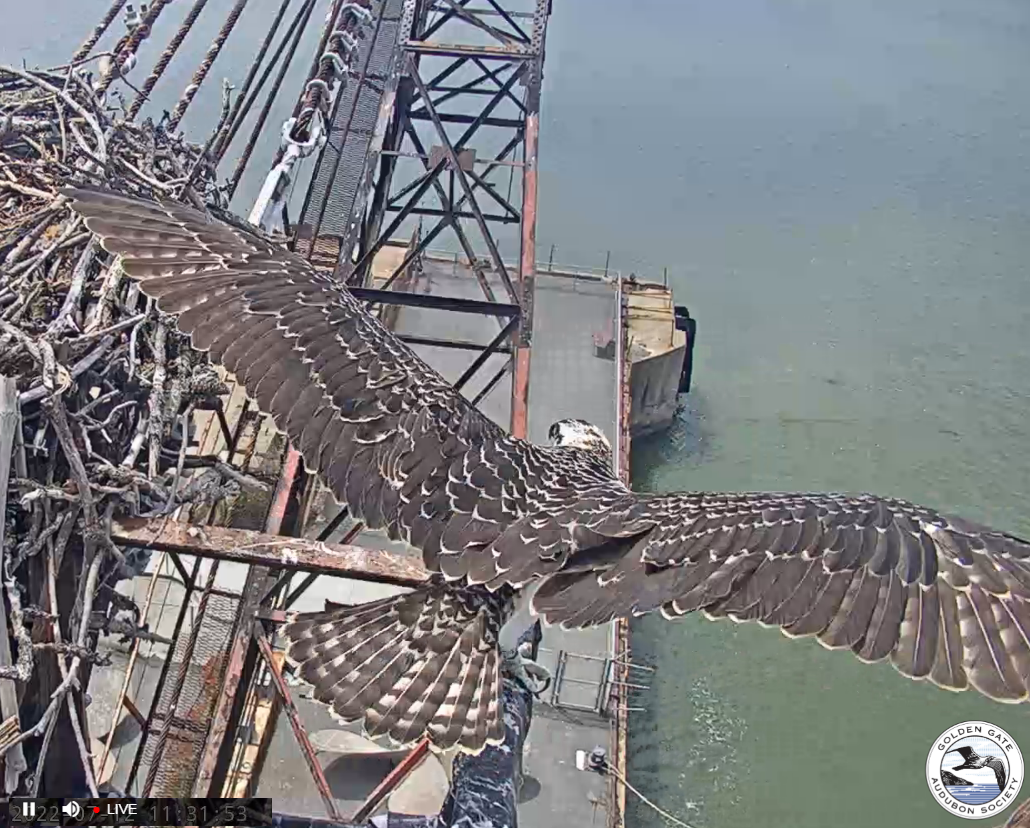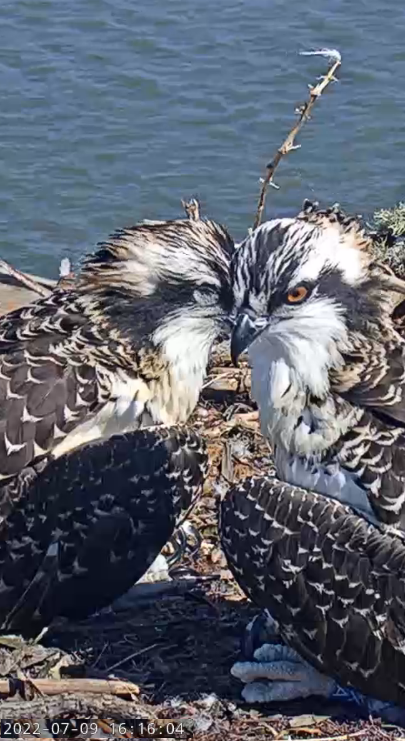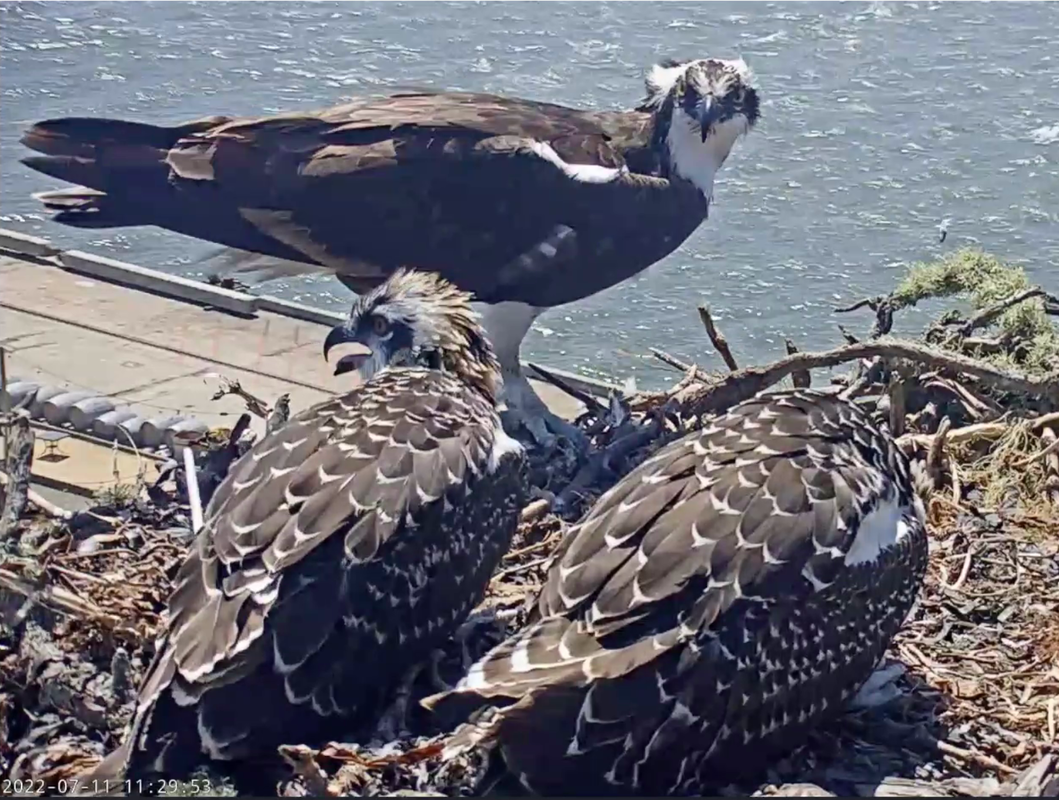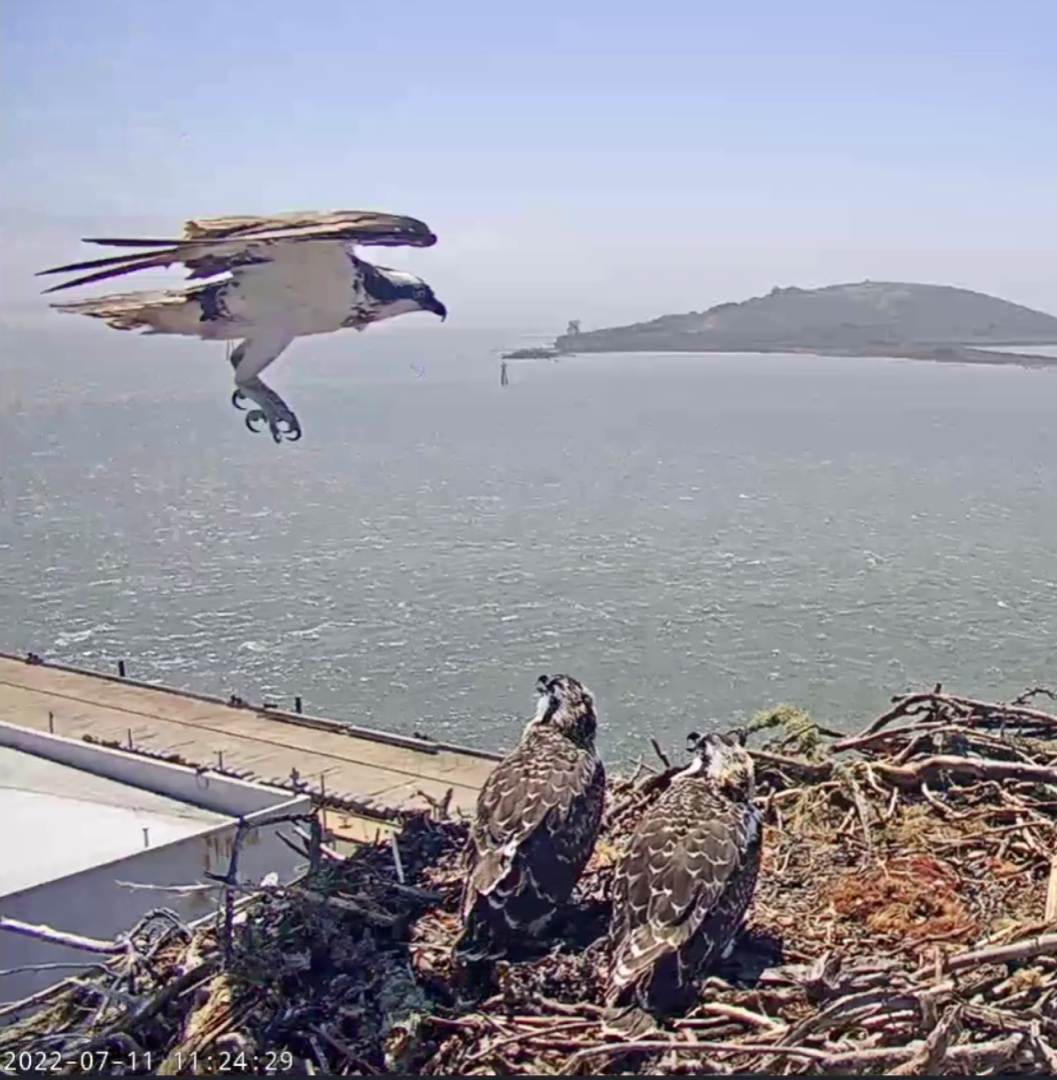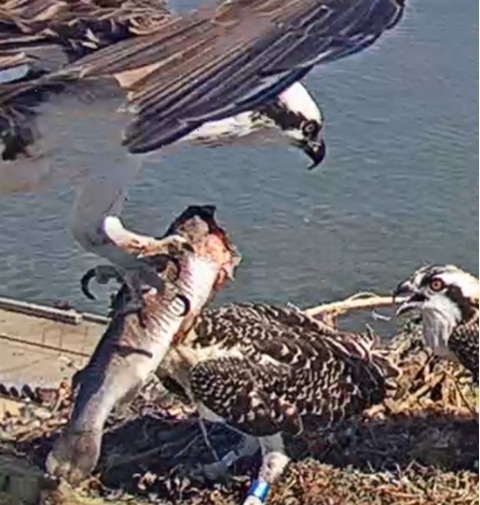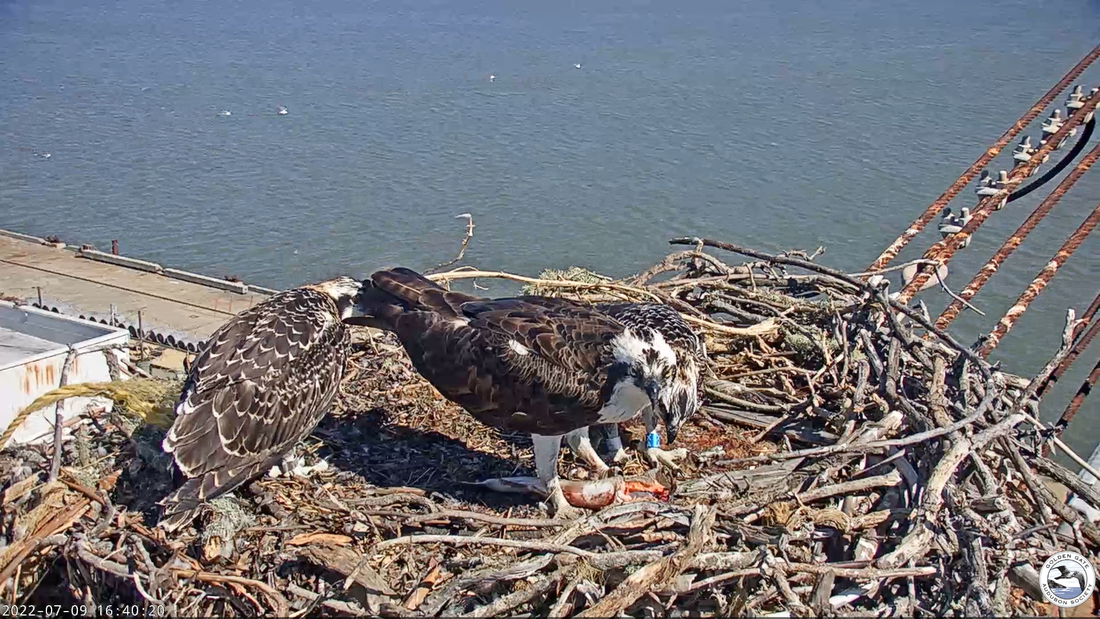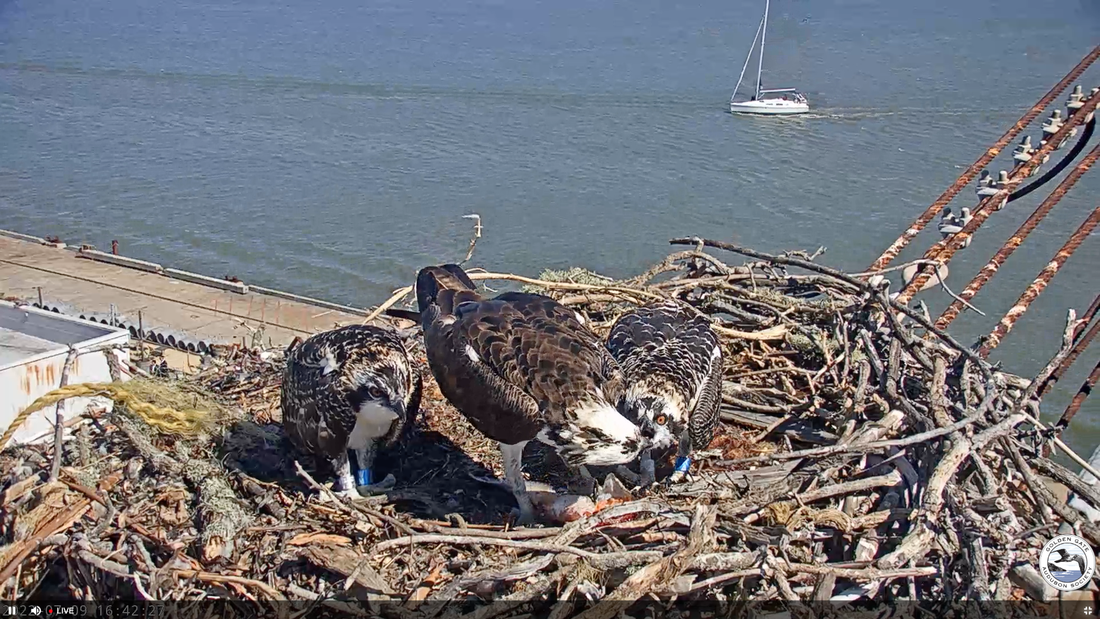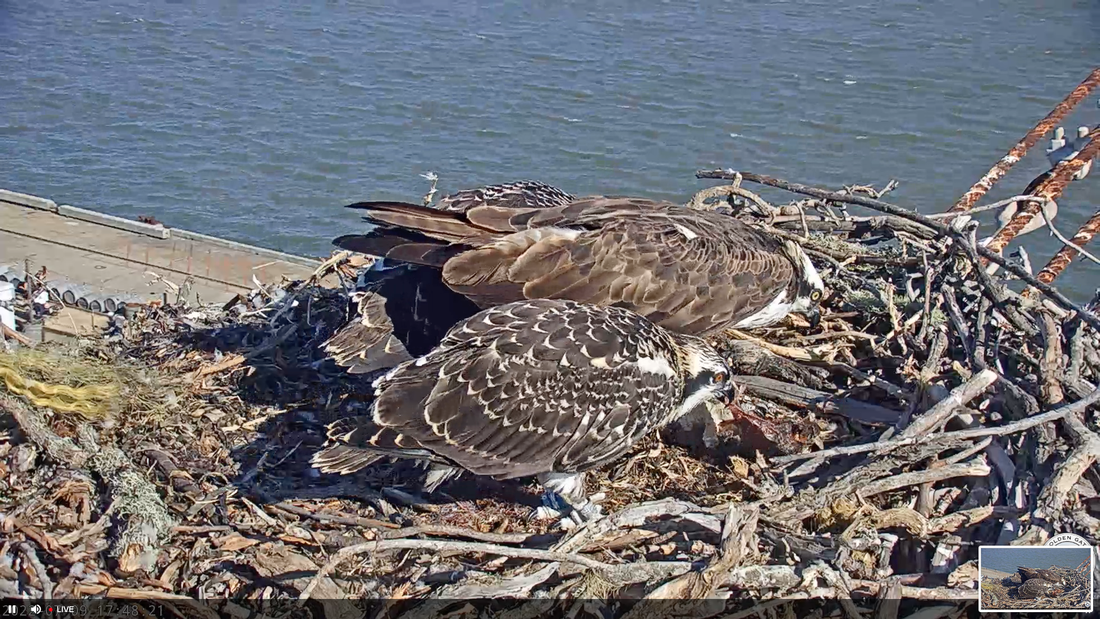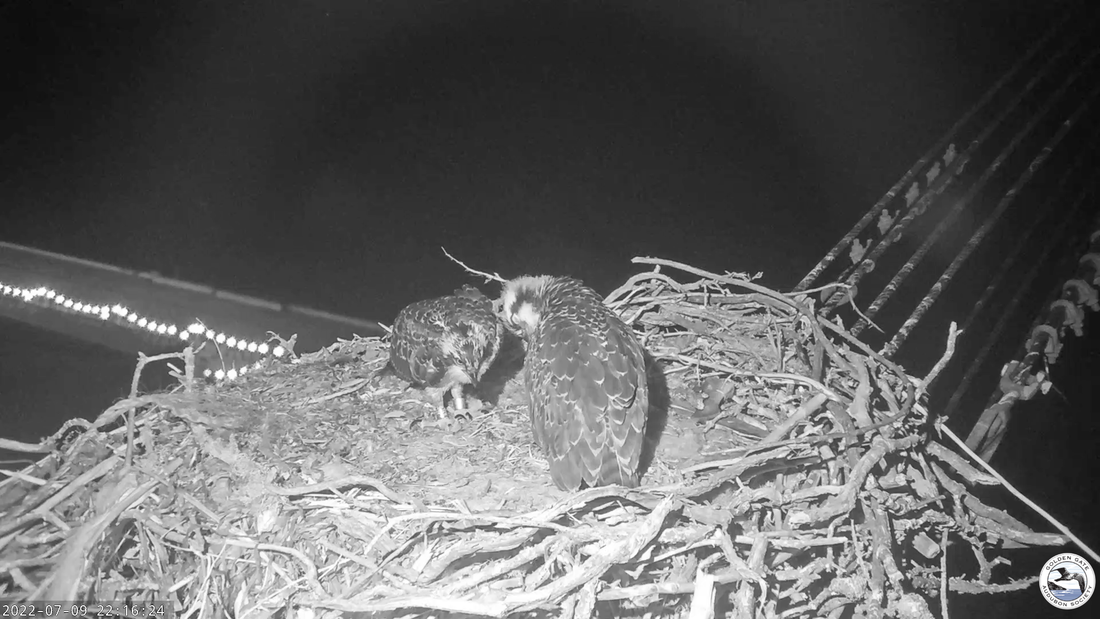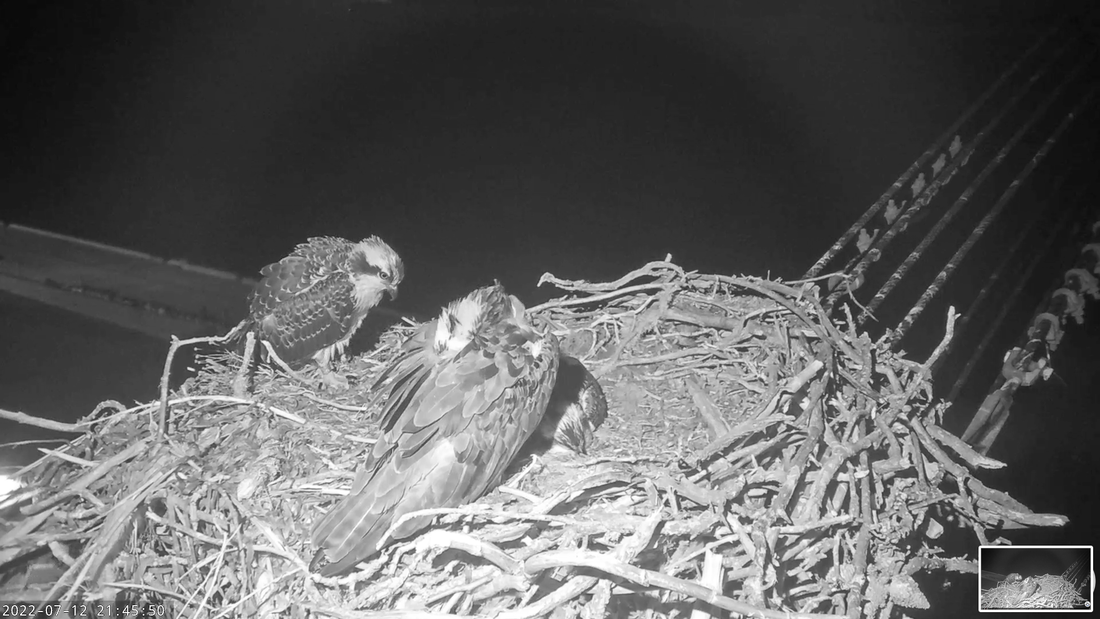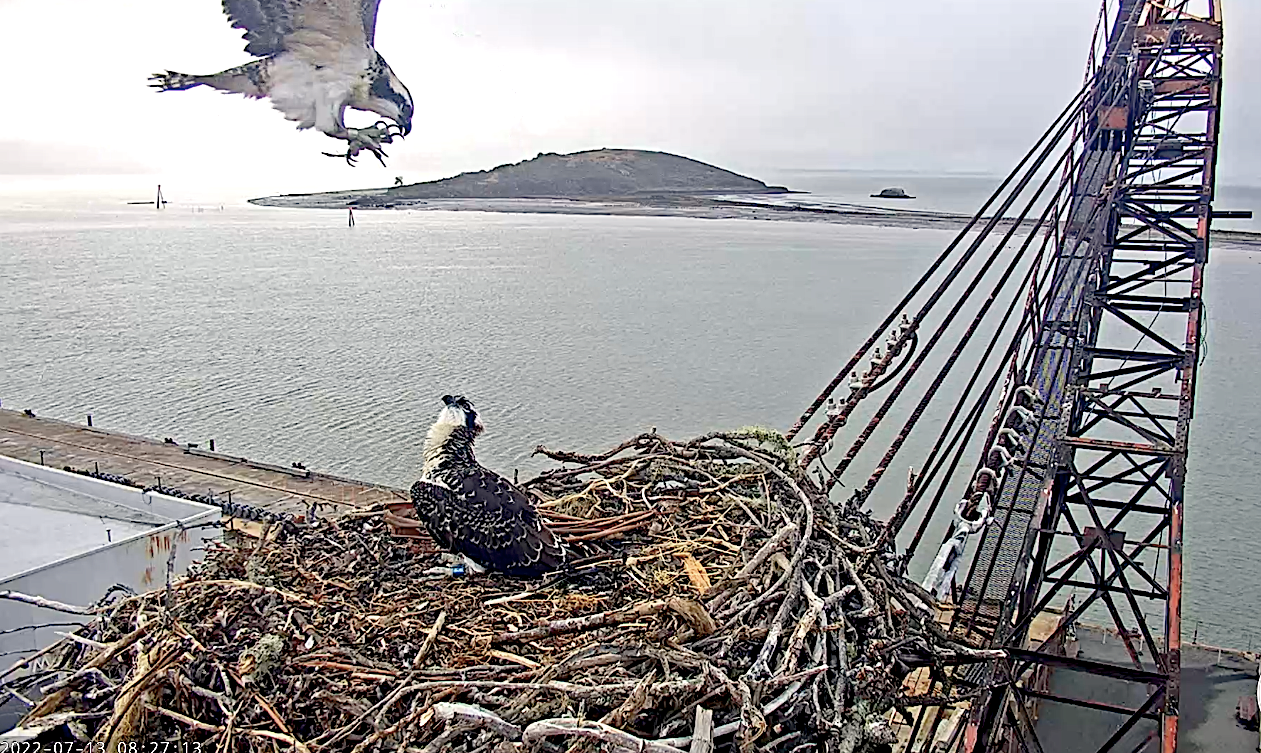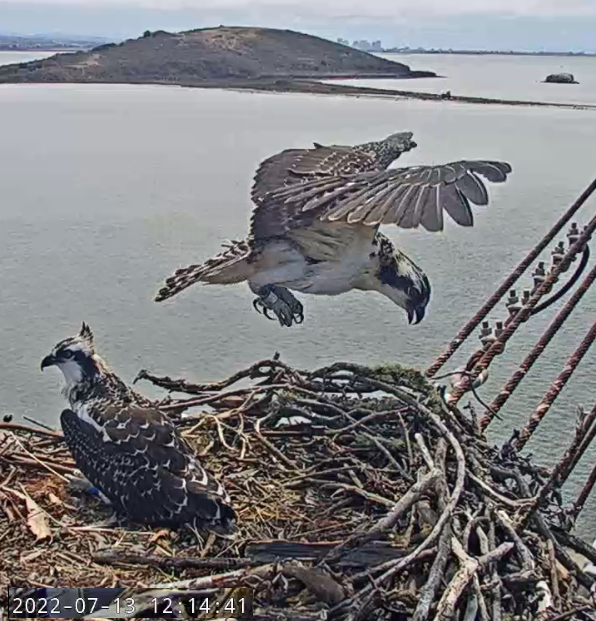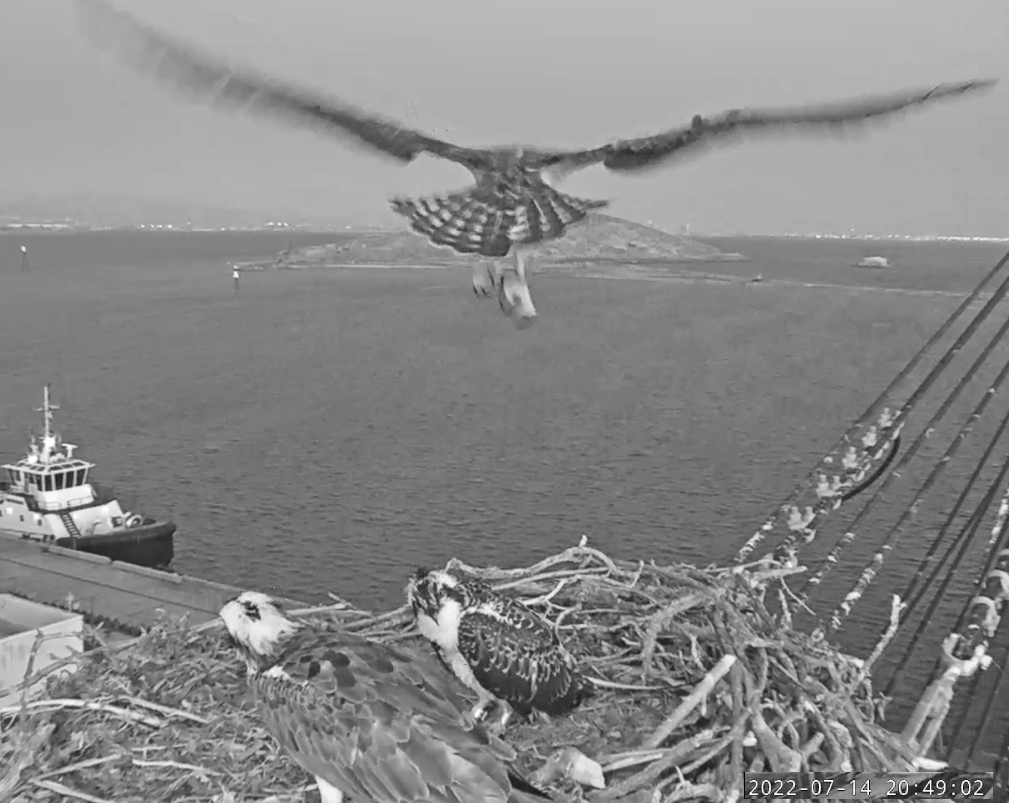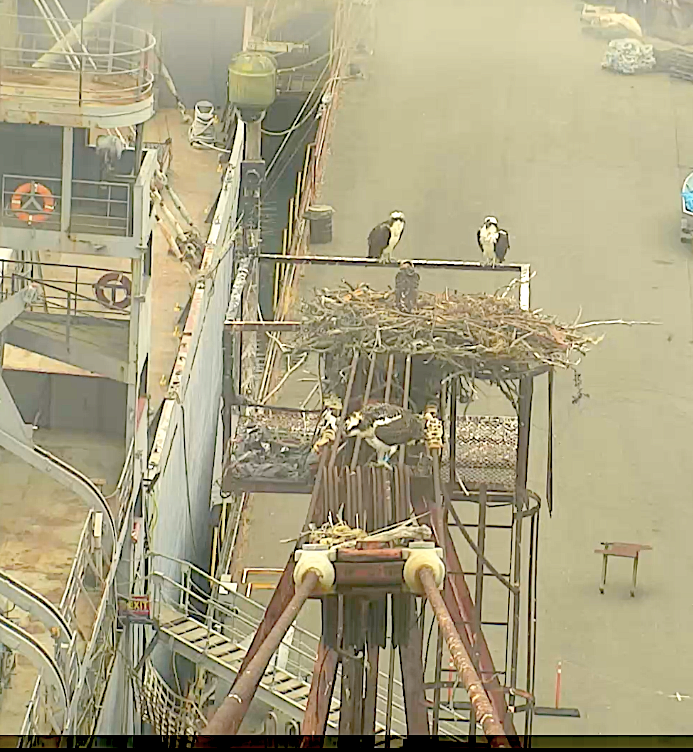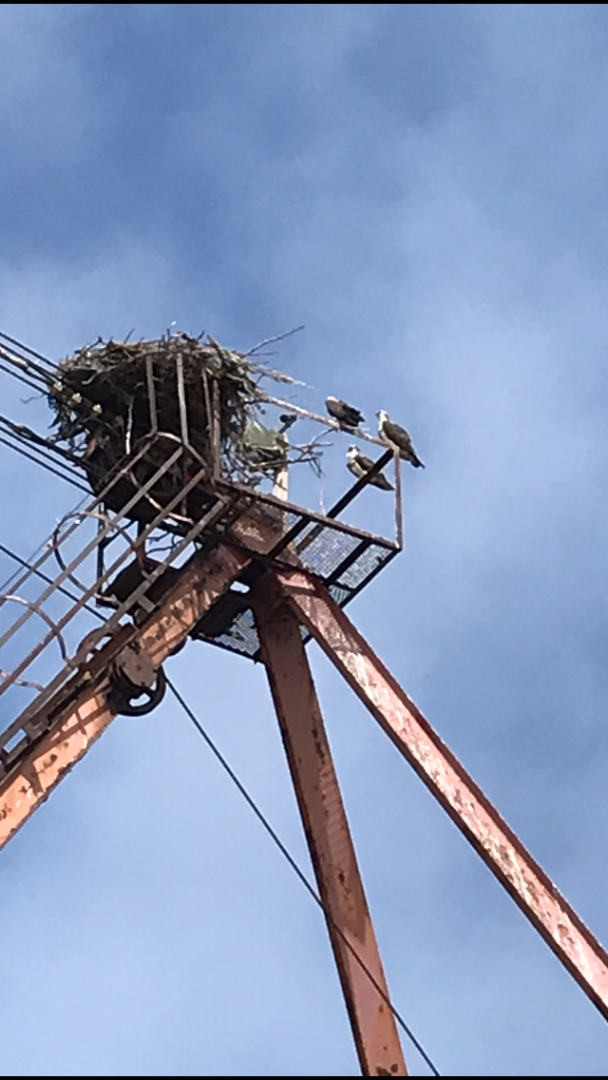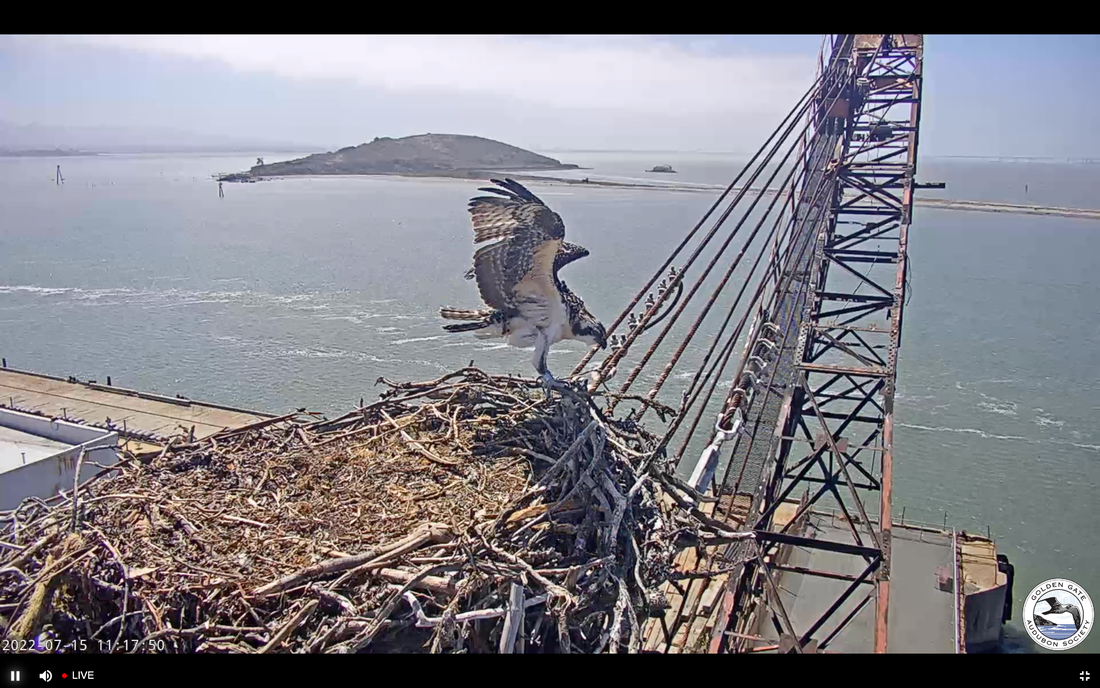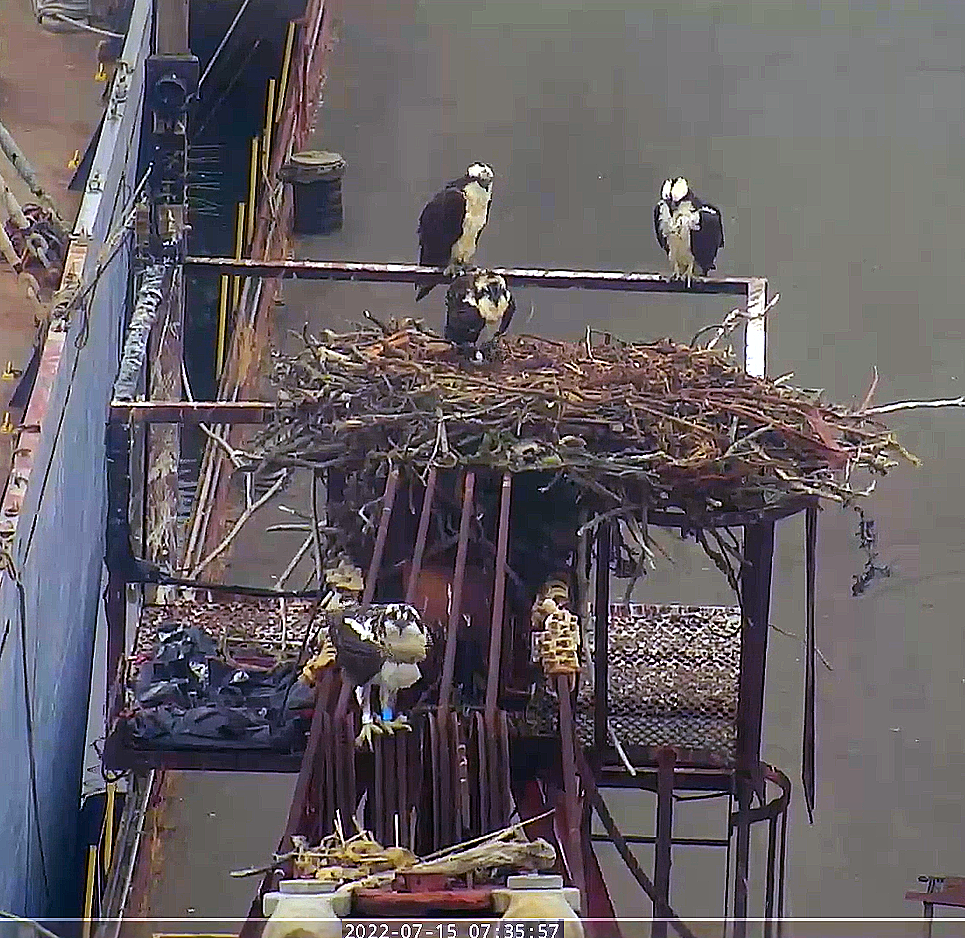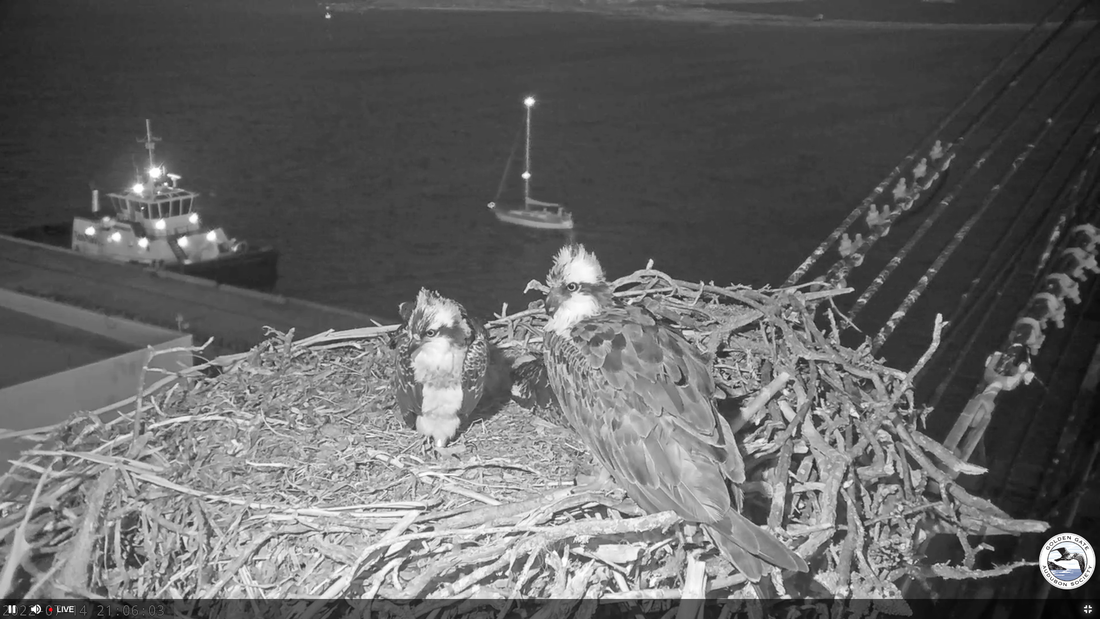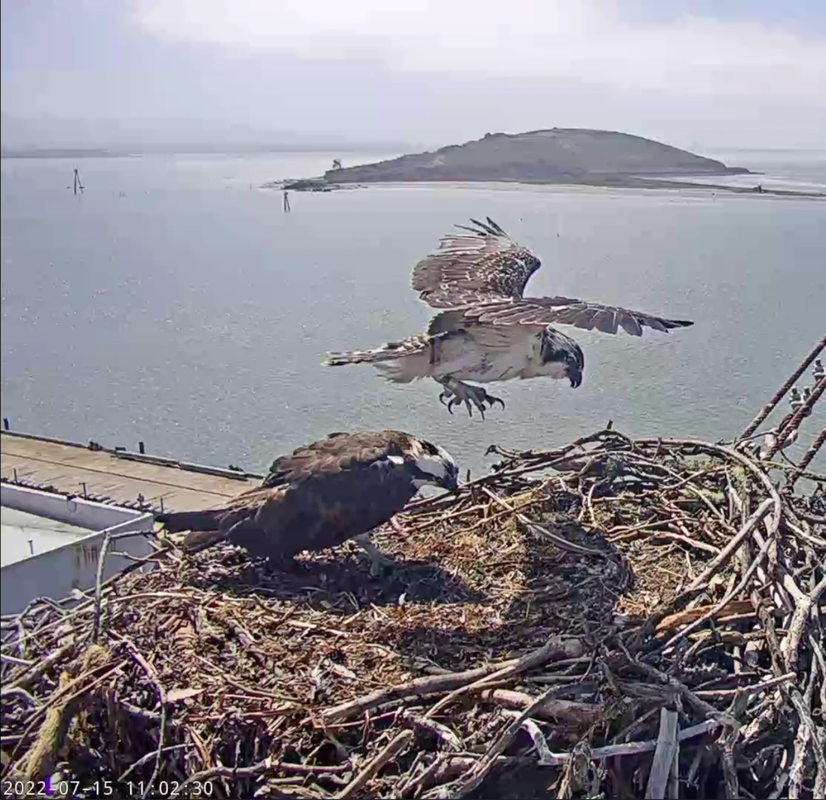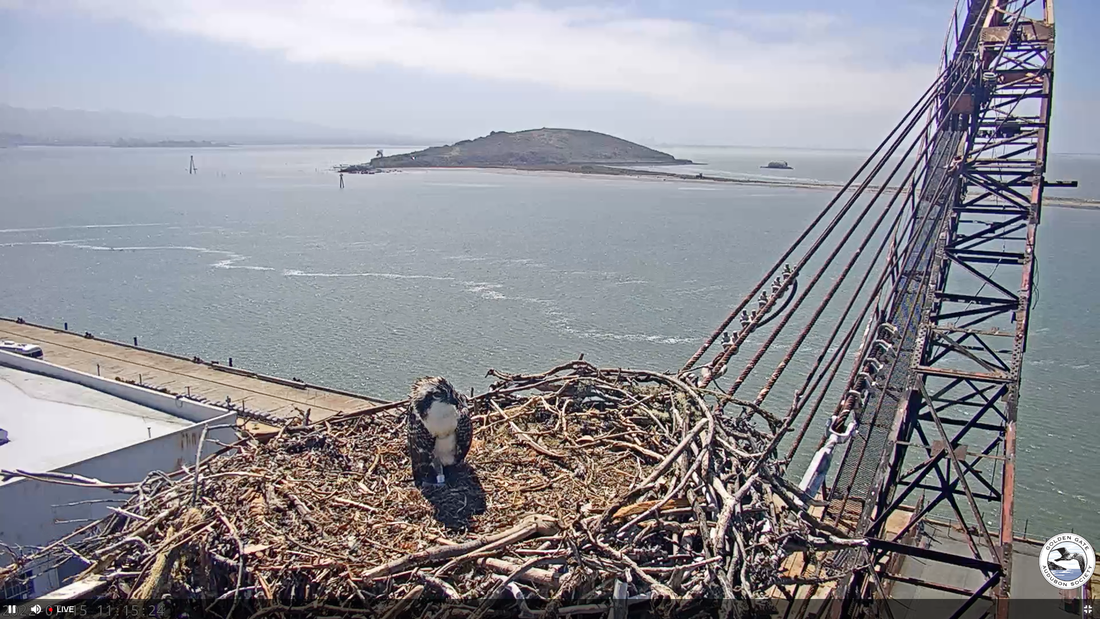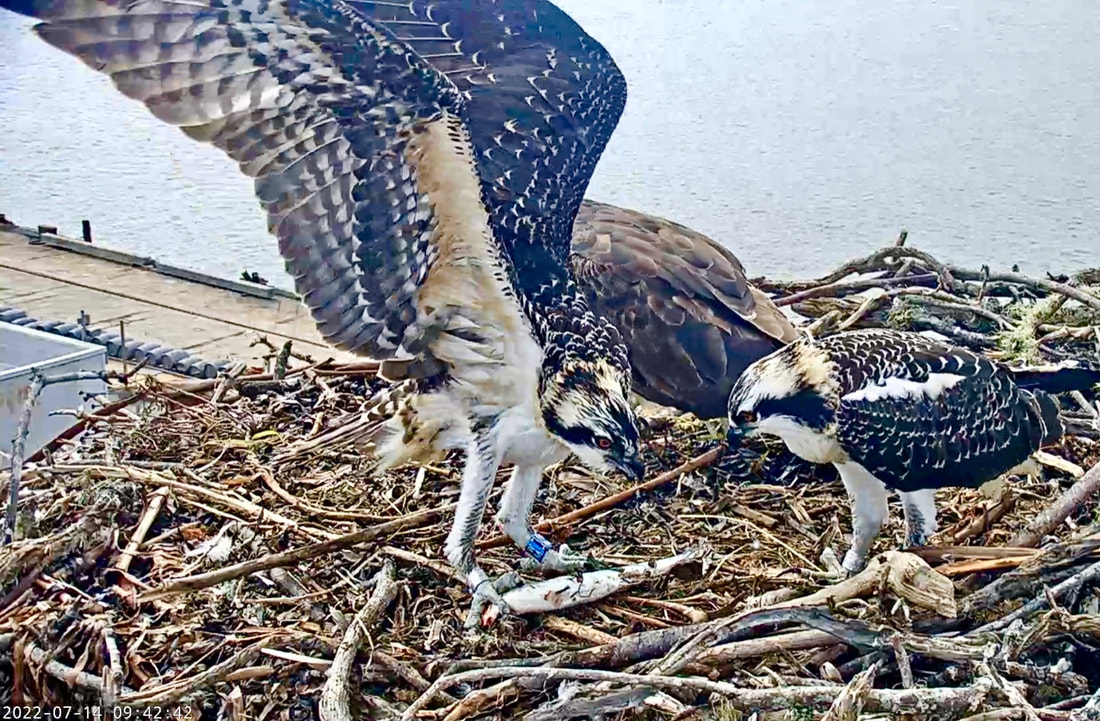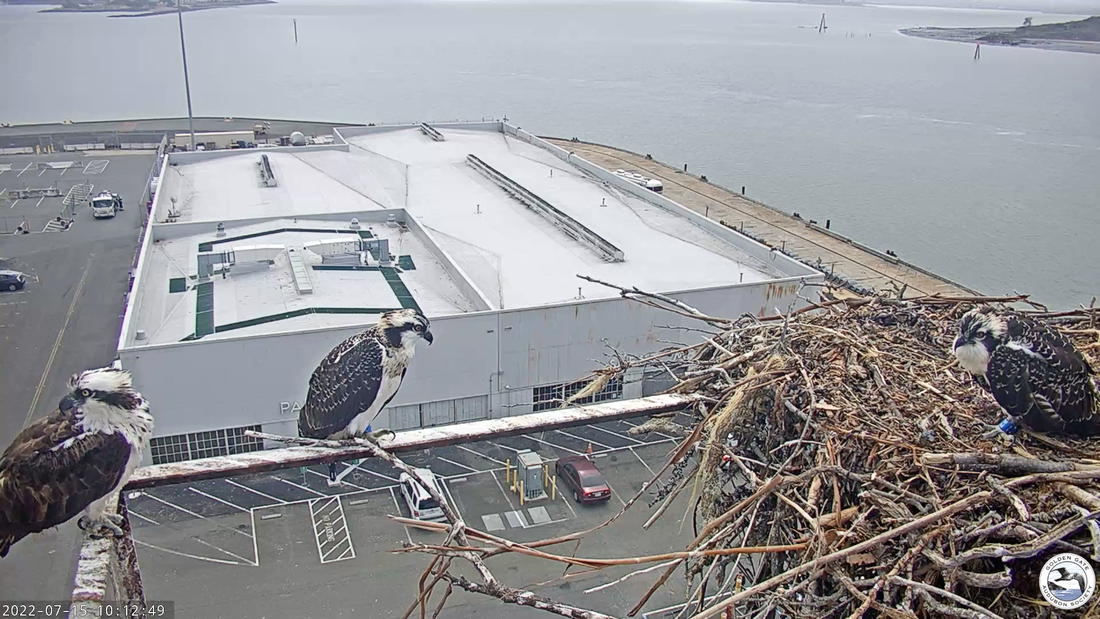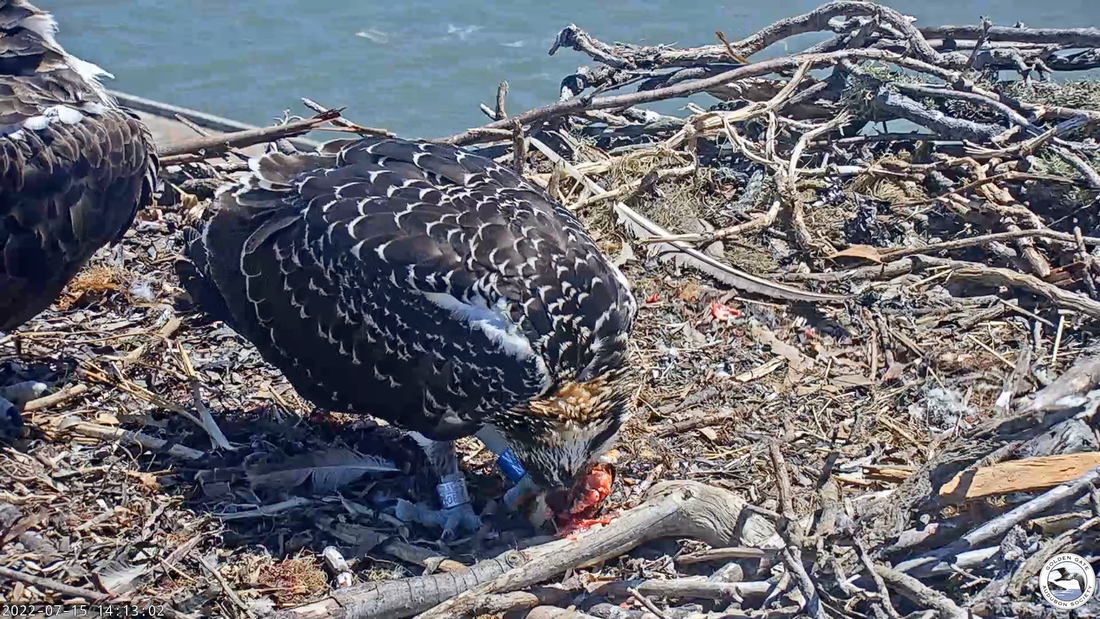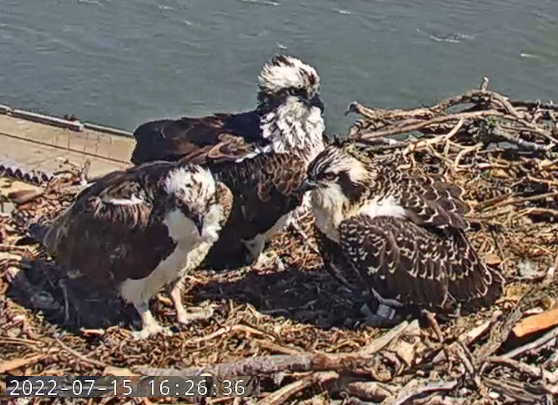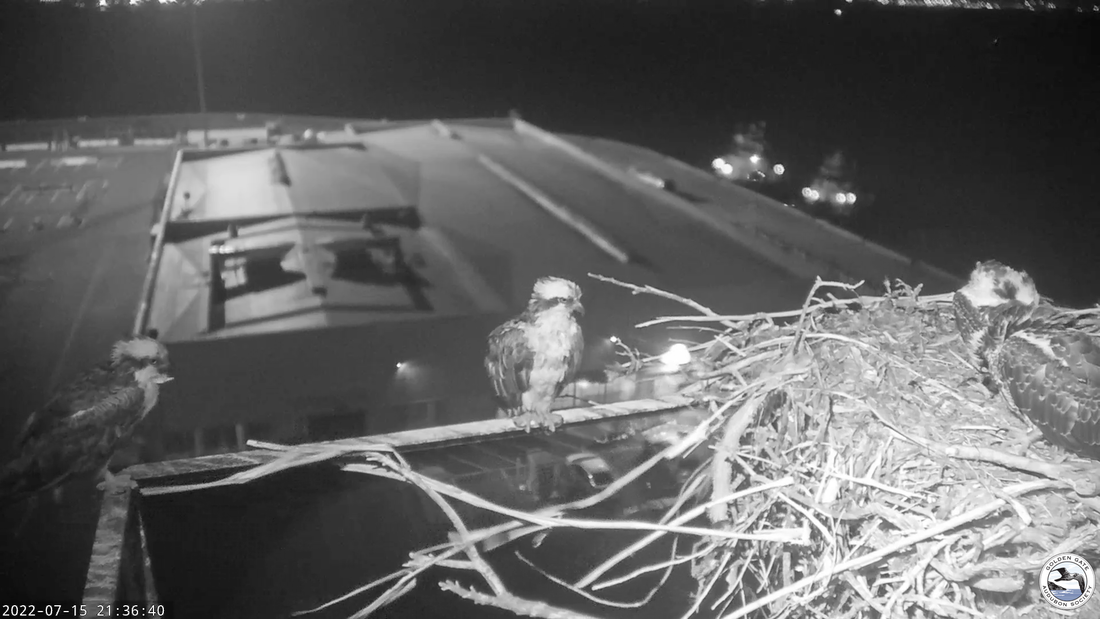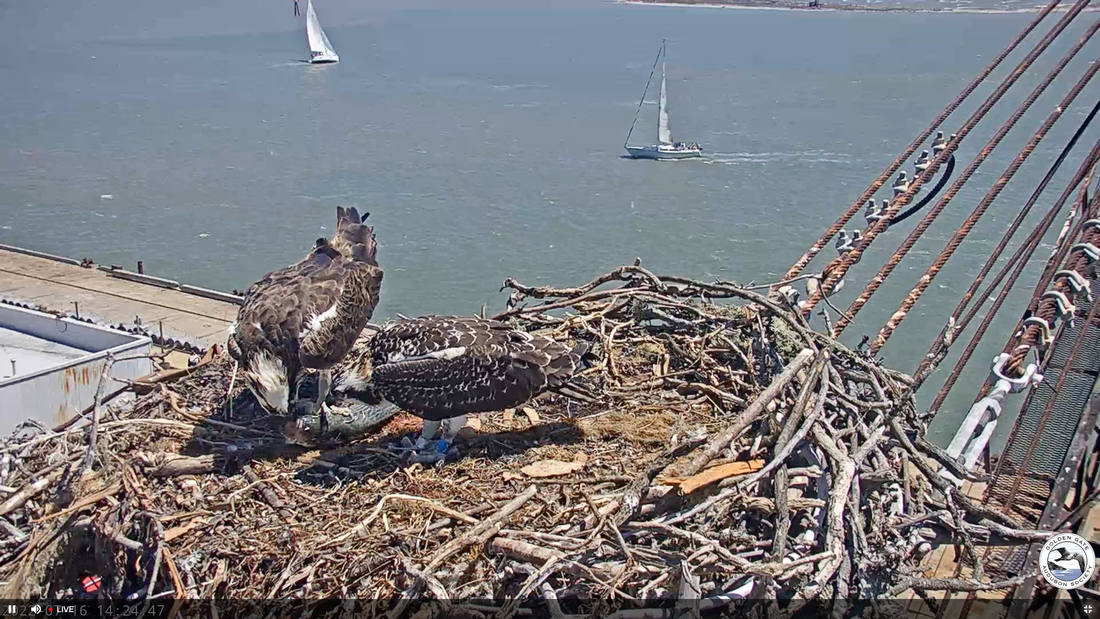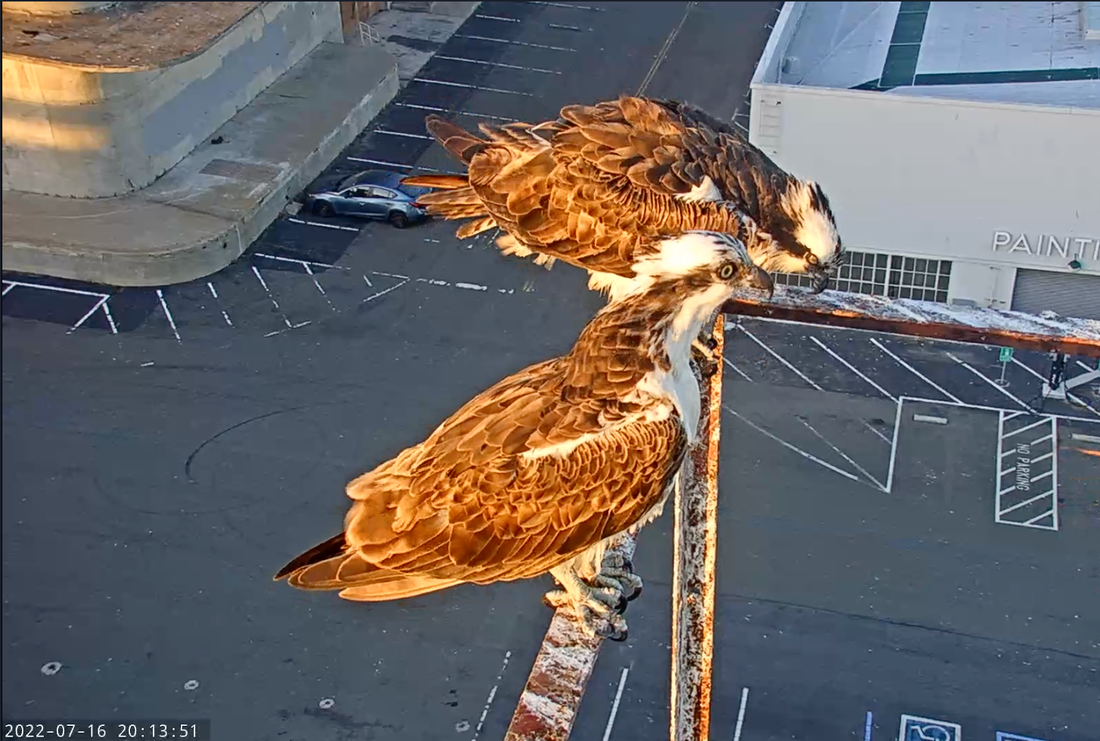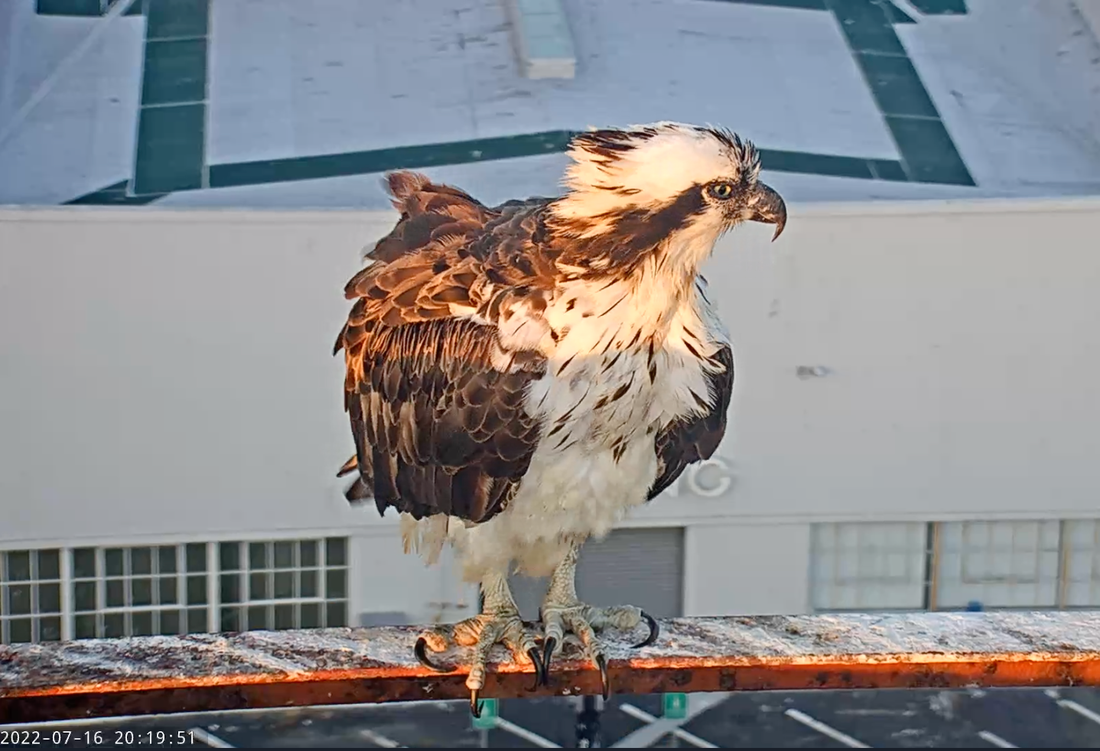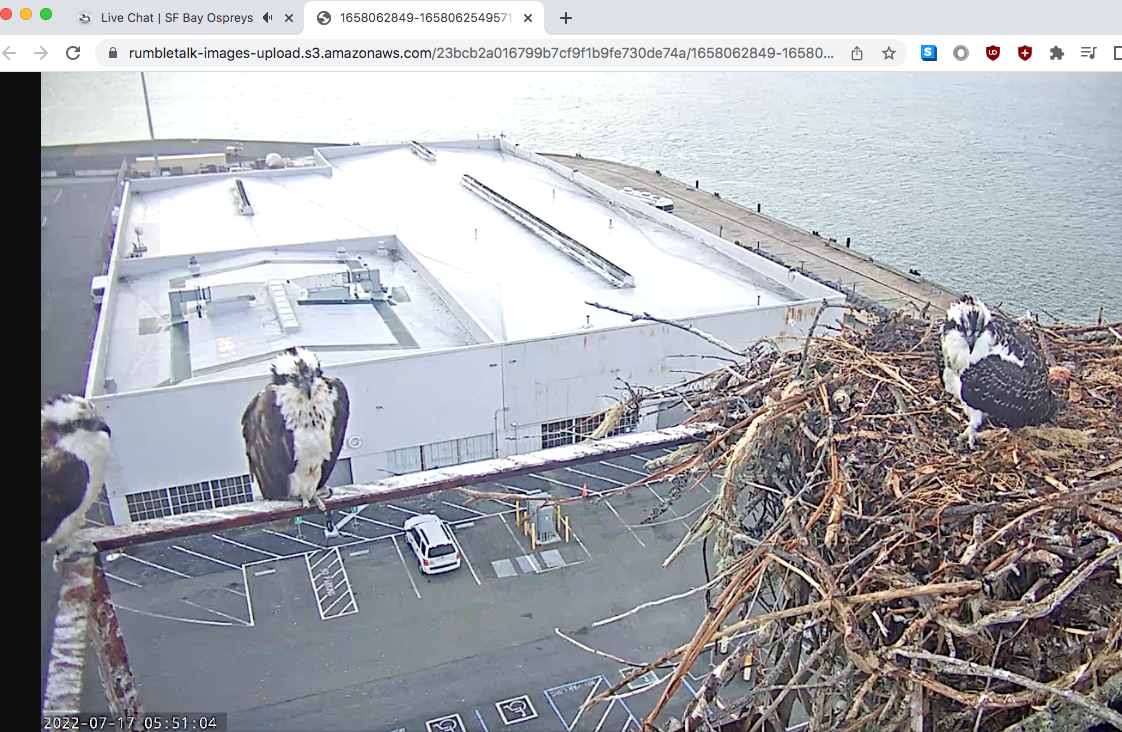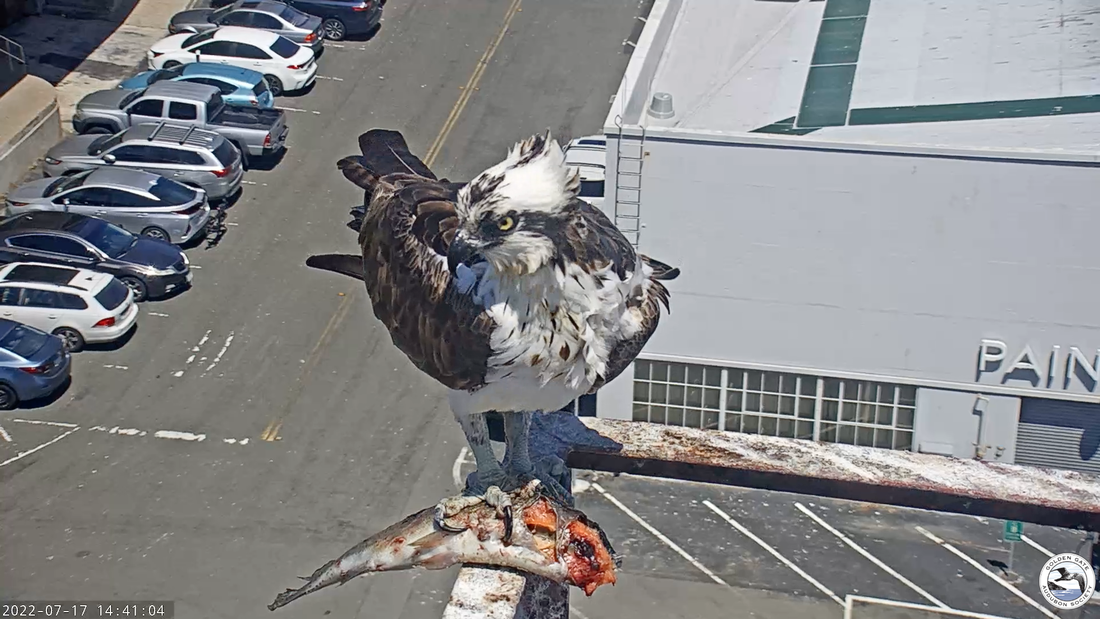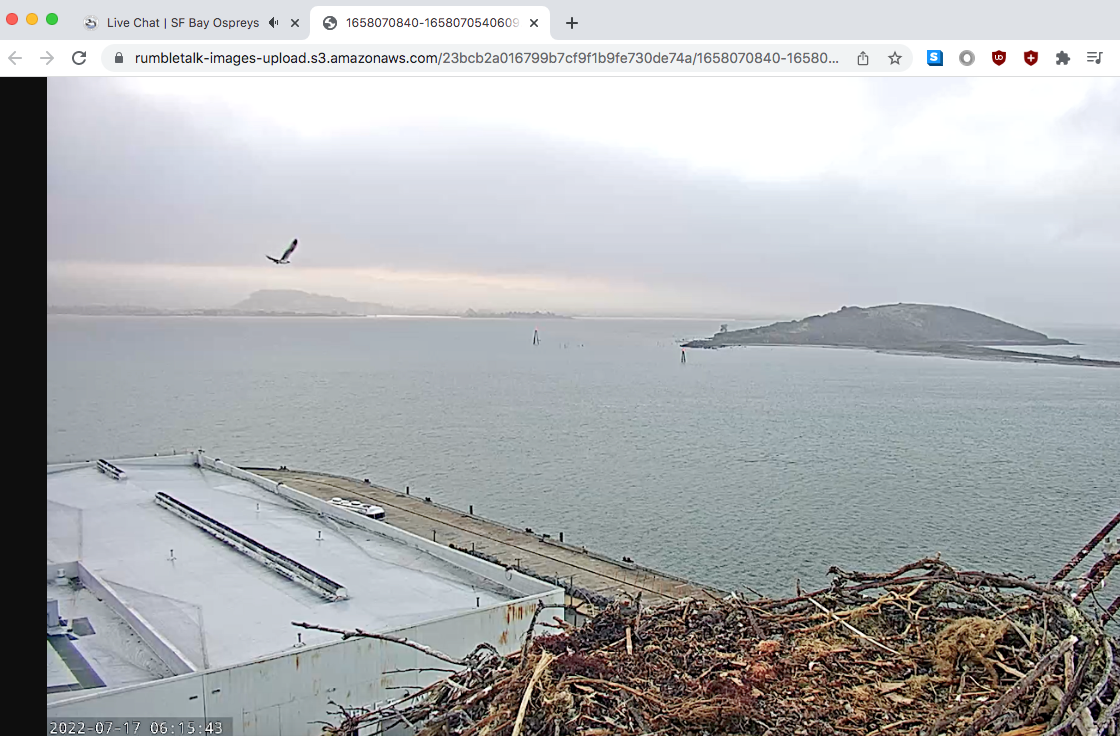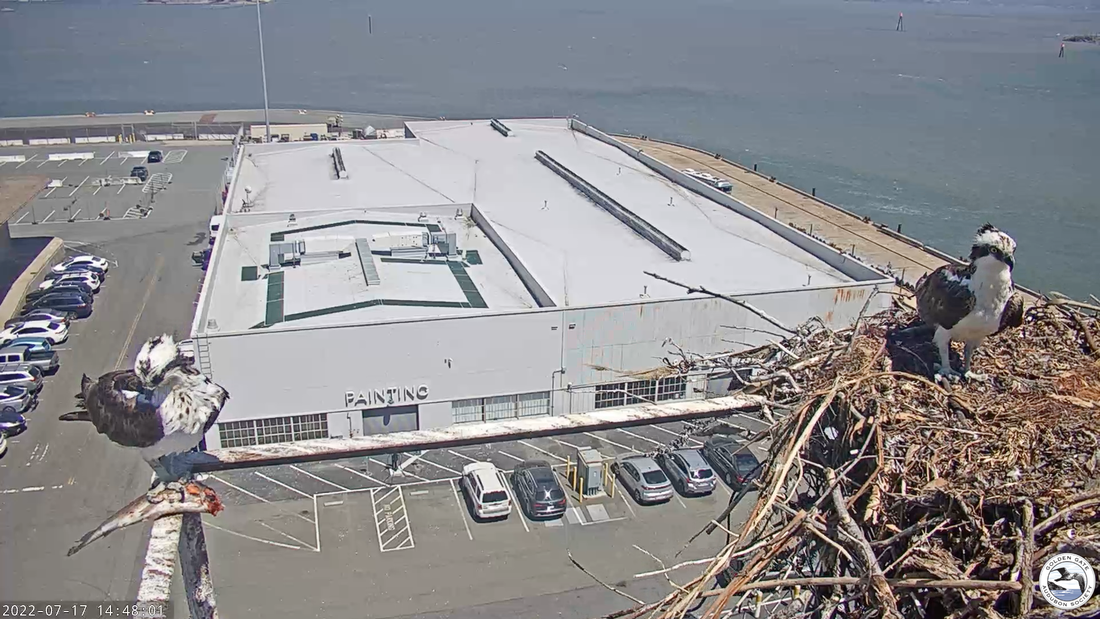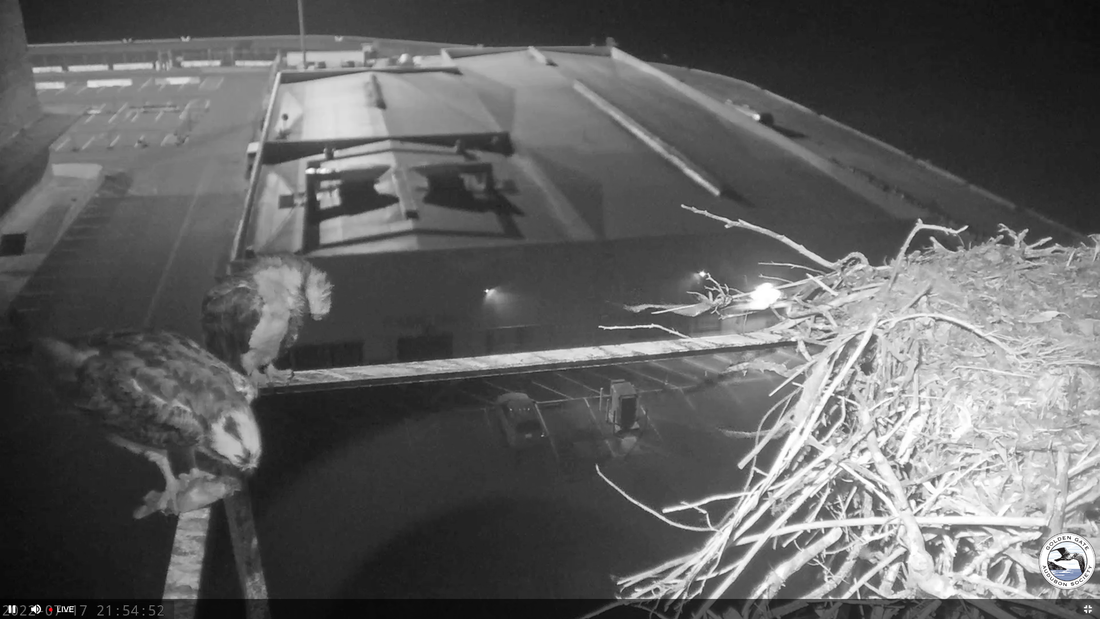Their feathers have come in, they have grown, and they have developed talons and strong legs. In short, they are ready to start practicing flying. And learn to be independent. They will spend the next few weeks doing just that. Their development is a bit behind the chart because they hatched later this year.
Osprey Lullaby Season 6 intro: CFC
C F C
Go to sleep now in the nest,
C F C
Just lie down and take a rest.
Dm G7 C
And I will tell you a tale
Dm G7 C
Of a boat that once set sail.
C F C
That boat flew the chicks way up high
C F C
To the blue moon in the sky.
C Dm G7 C
The moon rocked them on its swing
C Dm G7 C
And a lullaby did sing.
C F C
So they soon fell fast asleep
C F C
A sleep so soothing and deep
C Dm G7 C
That they fell right off that swing
C Dm G7 C
Back under their mother’s wing.
C F C
There they slept all through the night
C F C
‘Neath the shining moon so bright
C Dm G7 C
Under mother’s speckled breast
C Dm G7 C
On their very own sweet nest.
C Dm G7 C
Sleep now ospreys, sleep and dream
C Dm G7 C
Sleep and dream, sleep and dream.
F Dm F Dm C
Sleep, dream, sleep, dream ,sleep
Midi 2022
| Molate takes from Brooks June 29, 2022 | Brooks takes from Molate. June 29, 2922 |
Both parents are bringing fish, but Richie's fishing skills appear impaired this year. Is it his damaged talon or some other issue? He is bringing fewer fish and often seems tired after fishing. Rosie is taking up the slack. She knows a place to get Plainfin Midshipmen and can fly off the nest, catch one and return in under a minute. Her fishing place seems to be near Brooks Island by the sand spit. The daily fish count has been as high as seven, so the chicks are not starving. And one day, two fish were on the nest at the same time. Rosie has also been to the San Pablo reservoir and brought back trout. See the fish charts on chat for more information.
| New Type of Fish: With Richie impaired and not brining as many fish, Rosie has been going out more. She seems to be opportunistic and, not wanting to be gone long from the nest, fishes nearby. Although she has gone to the San Pablo Reservoir for trout. She has a place to get PlainFin Midshipmen near Brooks Island and now she has been bringing an orange fish believed to be an introduced goldfish. They are bright orange and quite distinctive when she flies in. (Garibaldi are another possibility but they don't usually live this far North, as they prefer warmer waters and kelp, such as in Monterey Bay.) All are speculating as to where she might be catching these fish, as she is gone for only 6 minutes. |
Week 8 July 7-13. First Fledge
Rosie brought a large striper to the nest about an hour after Molate fell and fed it to Brooks, baby-style. Then she and Richie stayed through the night and Brooks stayed on the nest.
In the early morning of July 17, Brooks took off, flying proficiently. Rosie brought a fish to the rail, but there was nobody there to receive it. Rosie faithfully kept the fish all night, finally finishing it herself.
There was little action on the nest on July 18. Chatters began to say the season was over with a sudden thump. Then on July 19. at 8am, Rosie was sitting on the rail when Brooks came flying in, chased by a gull and landed on the nest. And there she stayed, seeming a bit tired. Richie flew by once, looked startled and disappeared.
See video below by VA.
| From GGAS: Dear Osprey friends: We have watched with growing concern as the younger of the two Osprey offspring, Molate (band WM), shows signs that they might not be thriving. We are keeping our fingers crossed that they will survive to fledge in the next week. Like many wildlife species, Ospreys live vulnerable lives. Typically 10-20% of nestlings don’t survive to fledge, with the majority of deaths caused by lack of adequate food (Poole, 1984). Their highest risk of death is around 4-5 weeks after hatching, and it is unusual for nestlings older than that not to survive through fledging (Hagan, 1986). But even once they’ve fledged, they face steep challenges. Research suggests that fewer than 50% of young Osprey fledglings survive their first year. We can’t know whether Molate’s apparent decline is related to a lack of food resources or some other illness or injury. We do know that both chicks appeared healthy when they were banded last month. It is Golden Gate Audubon’s policy to minimize human intervention in the lives of wild birds. That includes reducing risks to birds from buildings and glass, pesticides and herbicides, and badly sited energy projects. Despite our deep personal connections to Rosie and Richmond and their offspring, they are not pets. We will not impose upon their wildness, nor will we make efforts that may inadver- tently harm otherwise healthy and productive individuals. That does not mean we will stand by idly. We will maintain vigilant observation of the nest, and should Molate end up somewhere in trouble, outside of the nest, we will make every effort to get them to care at one of our trusted partners, WildCare or Lindsay Wildlife, as only a California Department of Fish & Wildlife permittee is legally allowed to handle wild Ospreys. We share your concern for Molate, and hope our fears don’t come to pass. Moments like this remind us how precious and fragile life is – both human life and wildlife. Getting to know individual birds like Molate and Brooks (band XA) makes us more committed than ever to protecting our local birds, every- thing from magnificent raptors like this Osprey family to the towhees and finches in our backyards. With our thoughts on Molate and their family, Glenn Phillips Executive Director | From the Asst. Director of 07-10 11:36 Wild Care: "Lucy shared your email with me regarding the osprey chick in Pt. Richmond. After checking the live feed, it does appear that one of the chicks is not as strong as the other and is having some signs of labored breathing. The bird seems to be alert and standing normally at times as well. Unfortunately, as long as WM is in the nest, we have no ability to intervene. Because of their ages, the other osprey, who is healthy and doing well, would likely jump from the nest and this would cause significant injuries or death. Sadly, ospreys are a very high stress species and have very specific feeding and housing needs that are incredibly challenging to minic in captivity. For that reason, it is much better to keep the young bird in a natural, reduced stress setting, with parents who know how to care for him/her. Right now, WM looks weak, but otherwise is showing many positive signs and has a much better chance for a healthy life in the nest. If the osprey does come out of the nest, needs medical attention, and it is safe to intervene, WM should be taken to the closest wildlife hospital, which may be WildCare or Lindsay For similar reasons, it was decided to leave Molate's body where it is, in order not to disturb the remaining chick Brooks or deter Richmond and Richie from tending to their chick. The bottom line is that these are wild animals in an urban environment. Our role is to watch them, enjoy them and learn from them. We are not to disturb them or turn them into pets. They need to live wild and free. The human role is to assure that they may do so, even though they're in an urban environment, by removing any impediments such as trash, undue noise and activity below the nest, and any other dangers that can be mitigated within this urban environment. So far, this has been done successfully in the Richmond area and the osprey population is increasing. Let's keep it that way! -MW |
